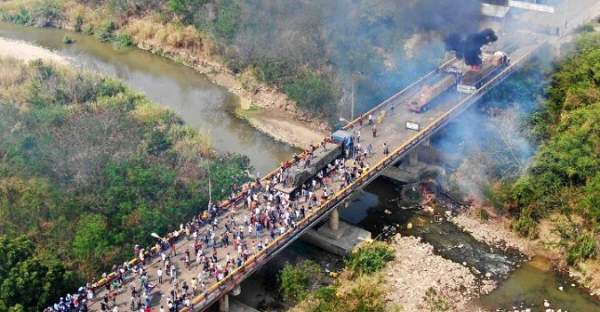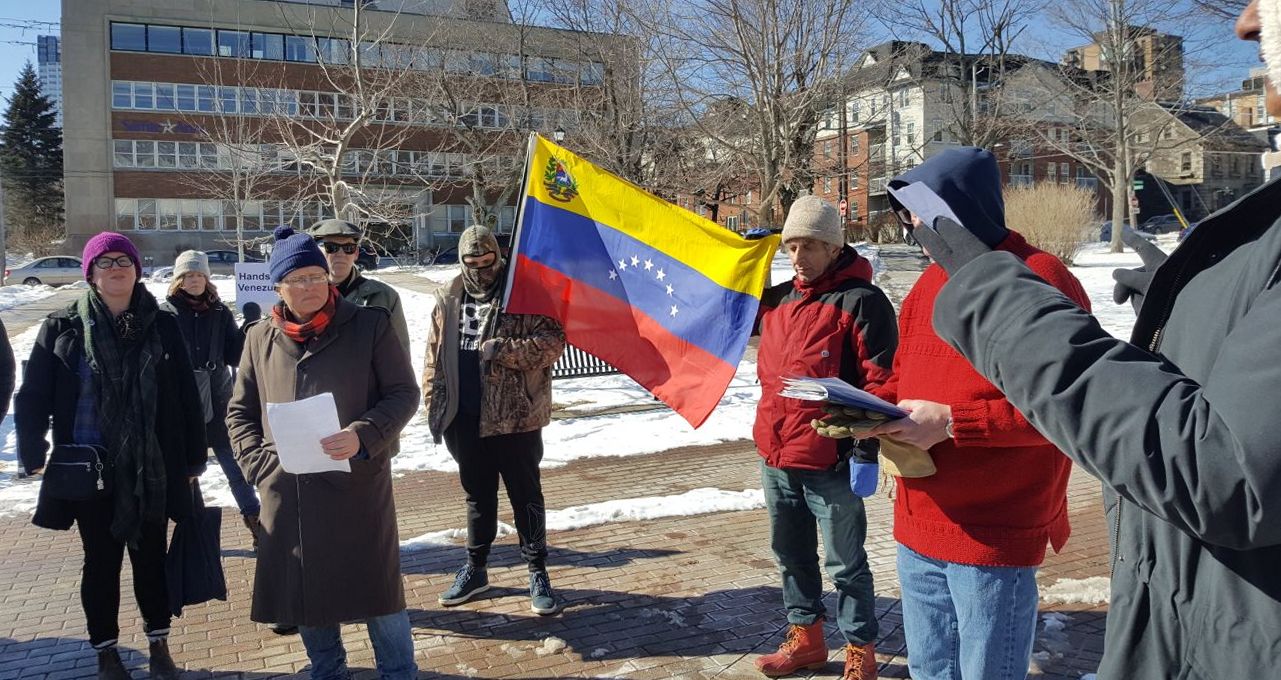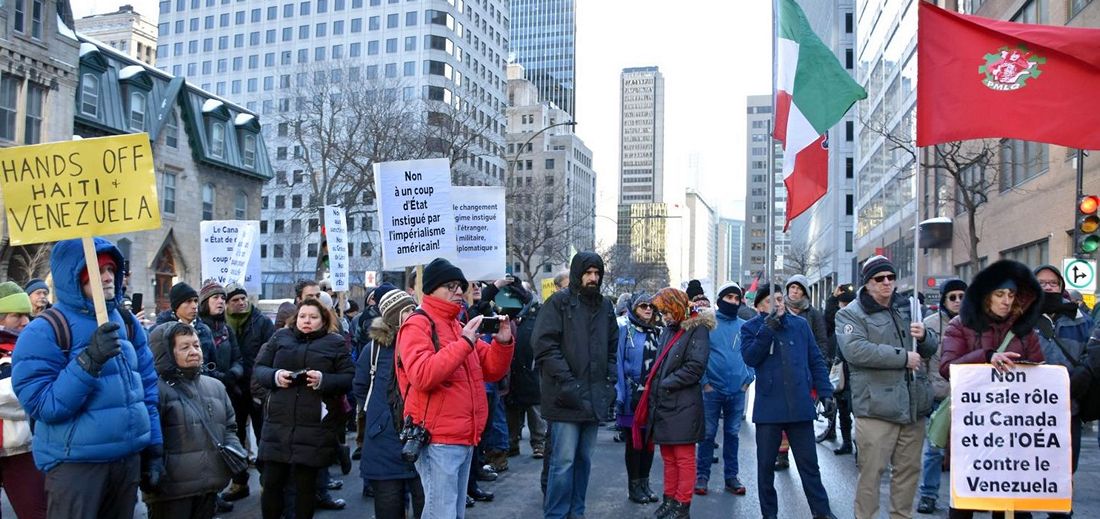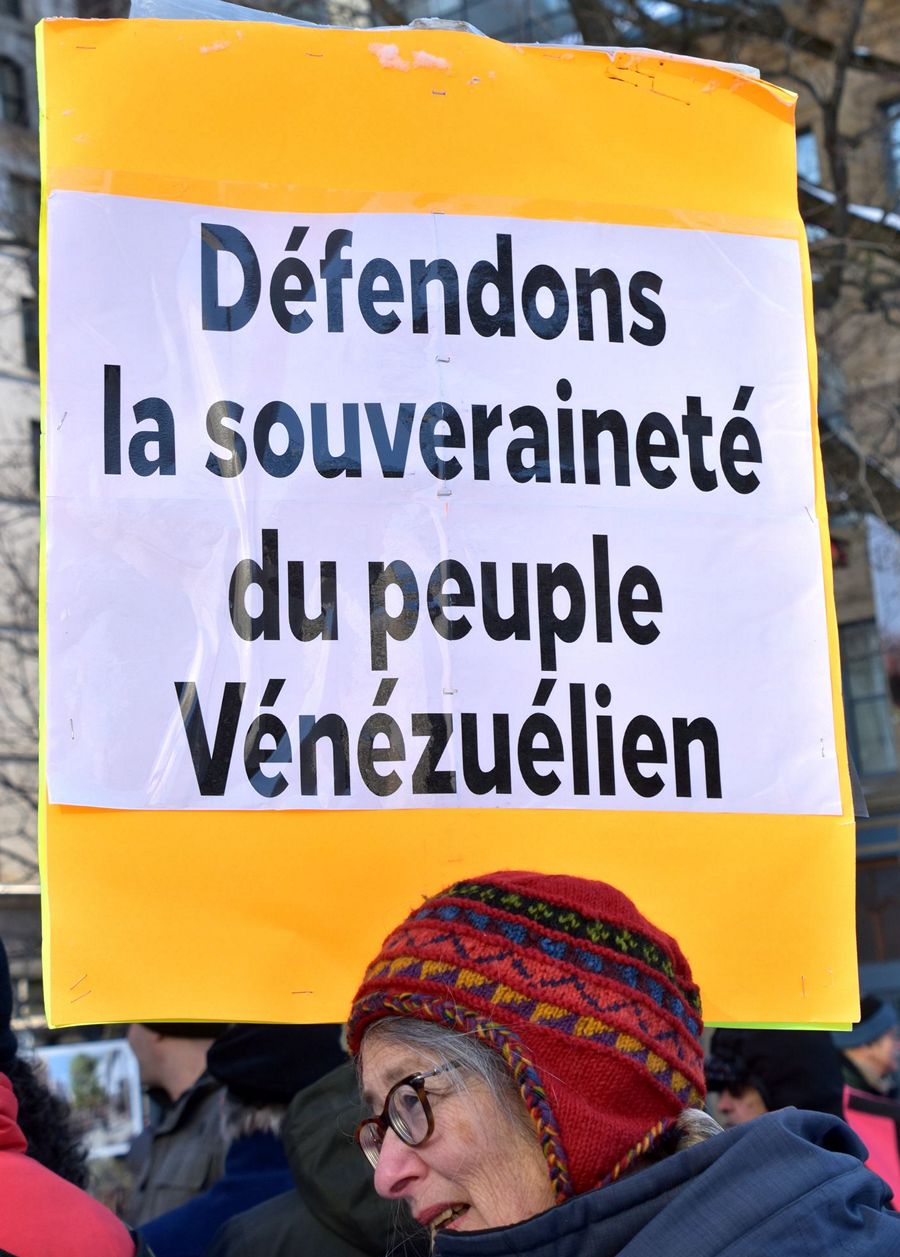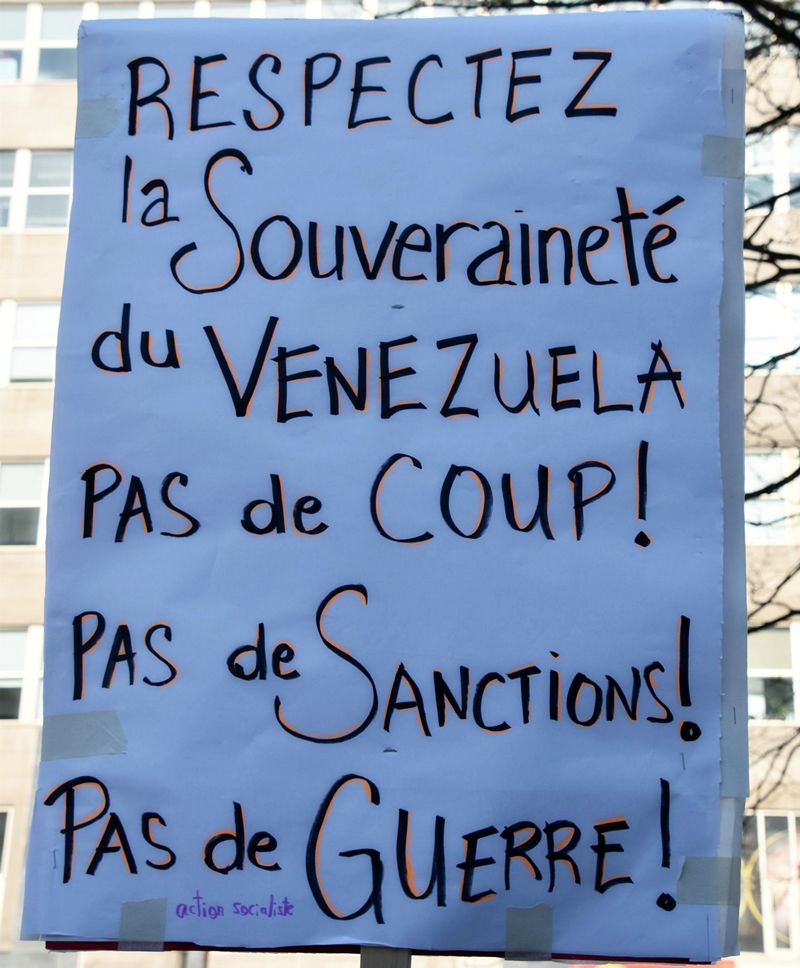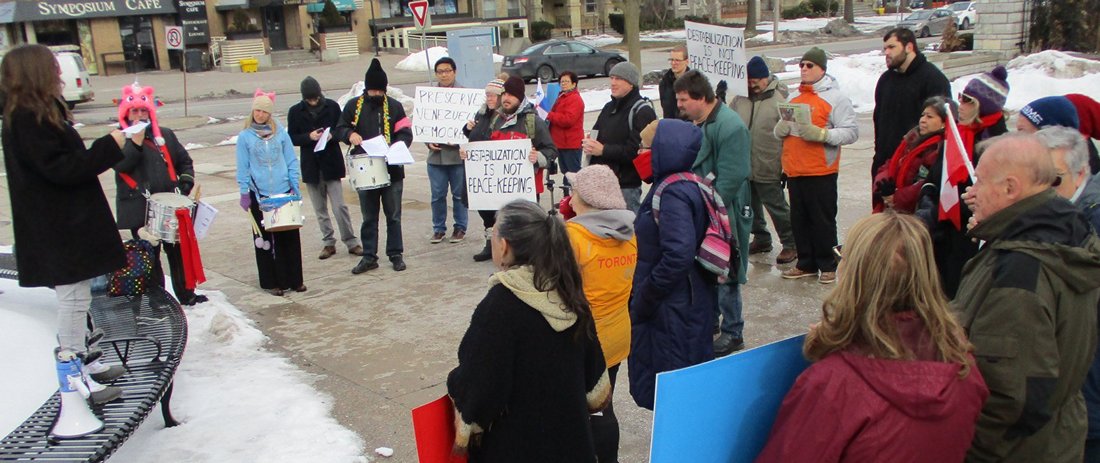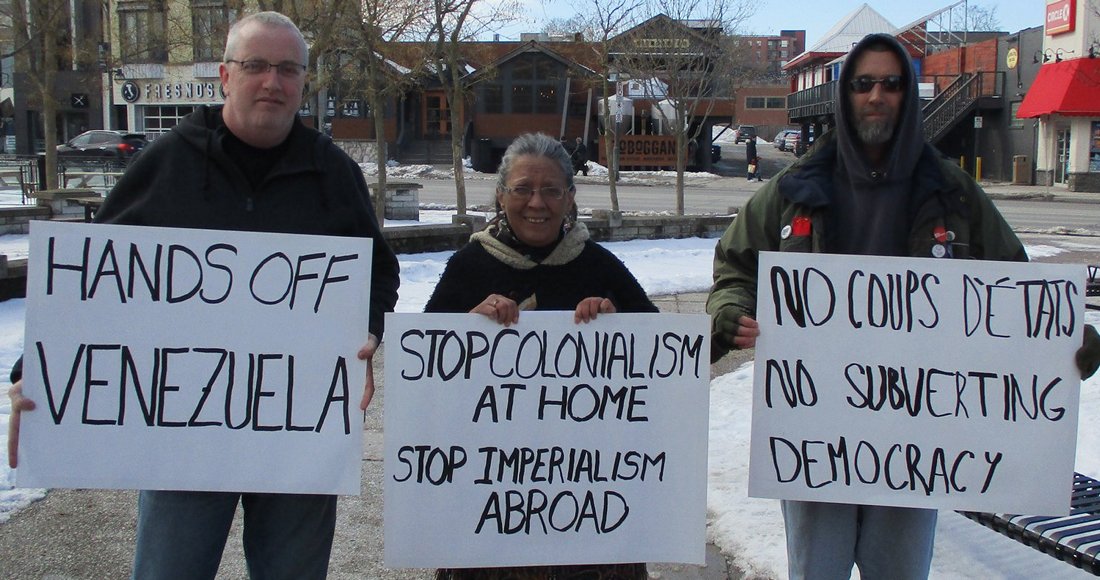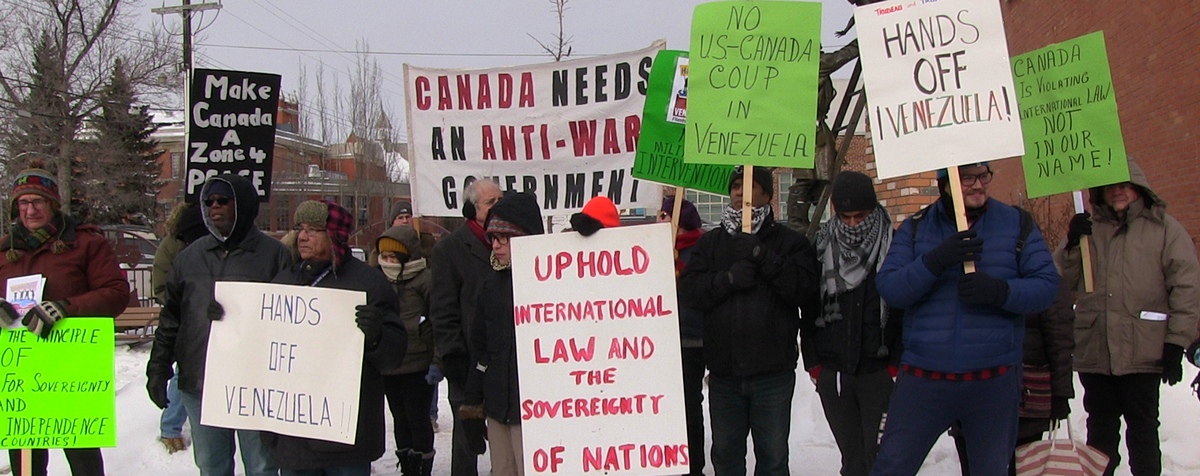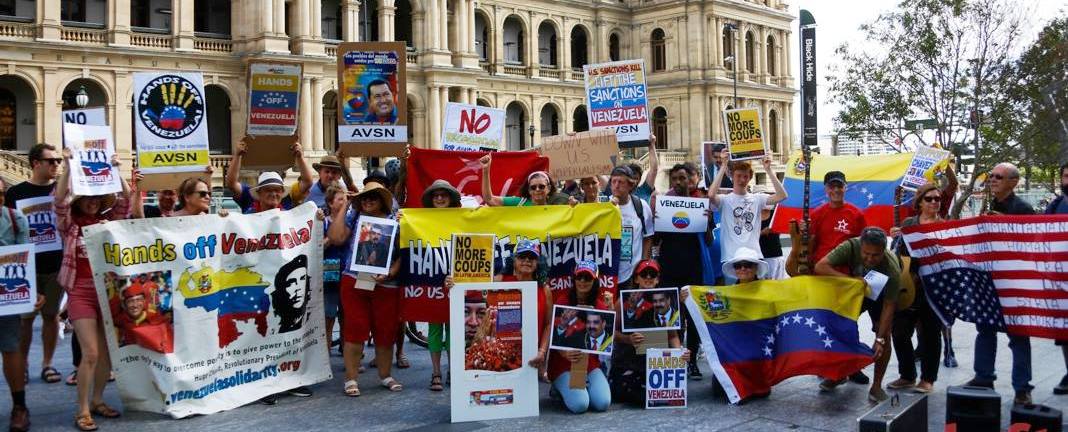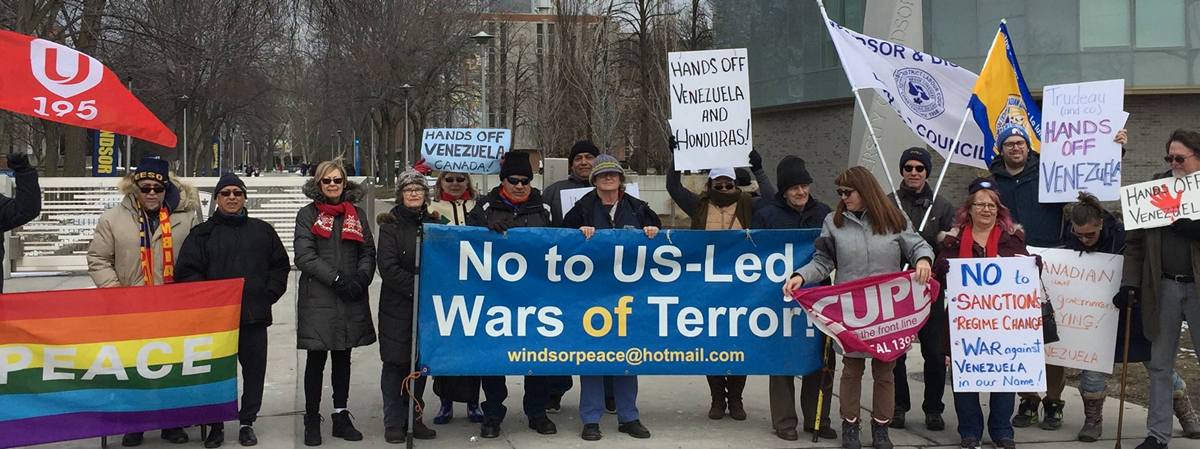
|
Supplement
International Battle Raging to Defend Venezuela End U.S. Coup and Threat of Invasion Against Venezuela!
|
|
|
In that tense discussion in Bogotá, there were also questions from U.S. officials about another of the assumptions that Guaidó transmitted at the beginning of the offensive against the regime: that Maduro's social base has disintegrated. The crisis revealed that, indeed, the support of his government waned, but it is not non-existent.
In that sense there were reproaches shared about the lack of commitment of the Venezuelan millionaires living abroad. A more determined contribution of money was expected to finance the defection of police, military and politicians to Guaidó. So far it has not happened. That is why important decision-making centres of the international community begin to warn that the Venezuelan opposition could lose the momentum that it gained with the emergence of Guaidó.
This was seen in the Lima Group meeting in Bogotá, which ended without any important definition on what course of action to take, after the failure of the operation to send in humanitarian aid. Guaidó had bet on Pence announcing the use of force to remove Maduro from power, but the Vice-President cooled those expectations.
At the end of the dialogue that Pence and Guaidó held in Bogotá, a very sensitive issue was addressed: How to guarantee the personal safety of the president "in charge," who they believe to be very compromised if he returns to Caracas.
One of the ideas considered was to see how feasible it was for the president "in charge" to take control of a part of the Venezuelan territory, where the local military would guarantee security and recognize him as the highest authority.
(February 27, 2019. Translated from the original Spanish by TML.)
February
23
International
Day
of
Action
"Hands Off Venezuela!"
On the weekend of February 23-24, rallies, marches,
pickets and other actions were held in more than 150 cities and towns
around the world in solidarity with the people of Venezuela and their
Bolivarian revolution. The rallying cry of actions everywhere was
"Hands Off Venezuela! No U.S. War on Venezuela!"
Canada
Halifax, NS
Montreal, QC
Ottawa, ON

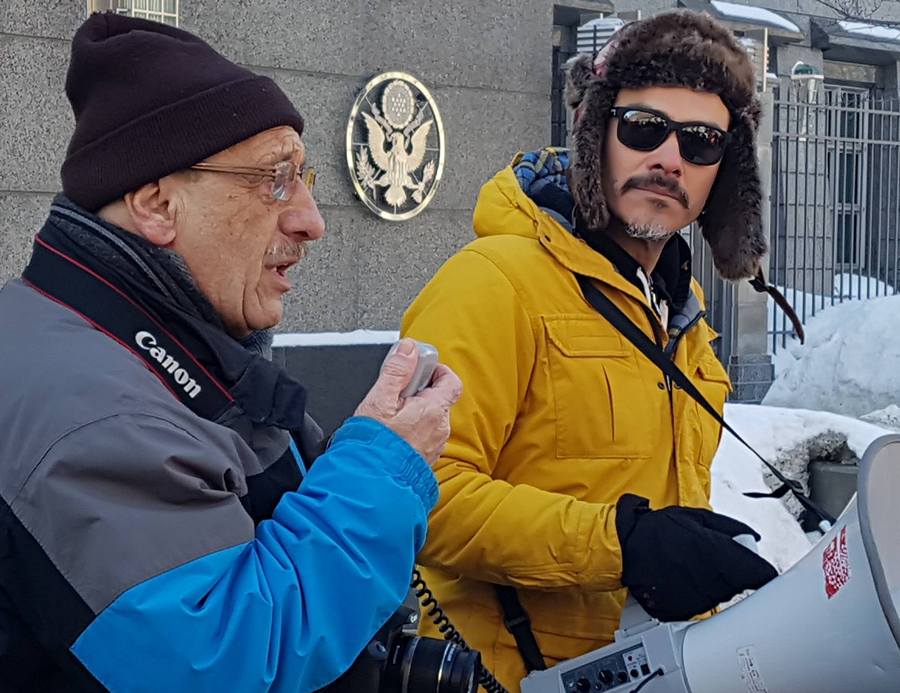

Toronto, ON


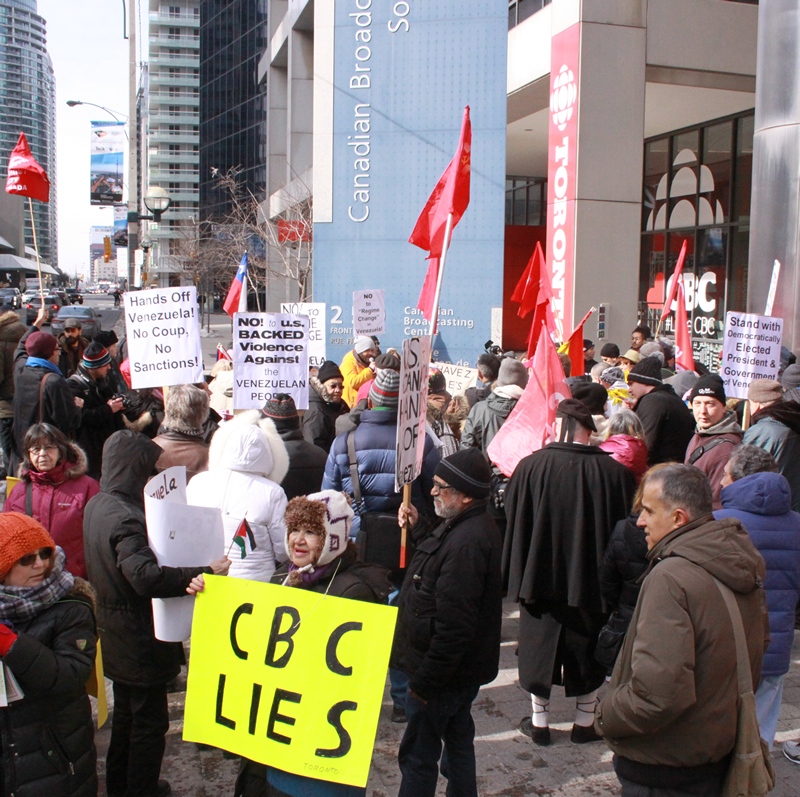
London, ON
Windsor, ON

Winnipeg, MB

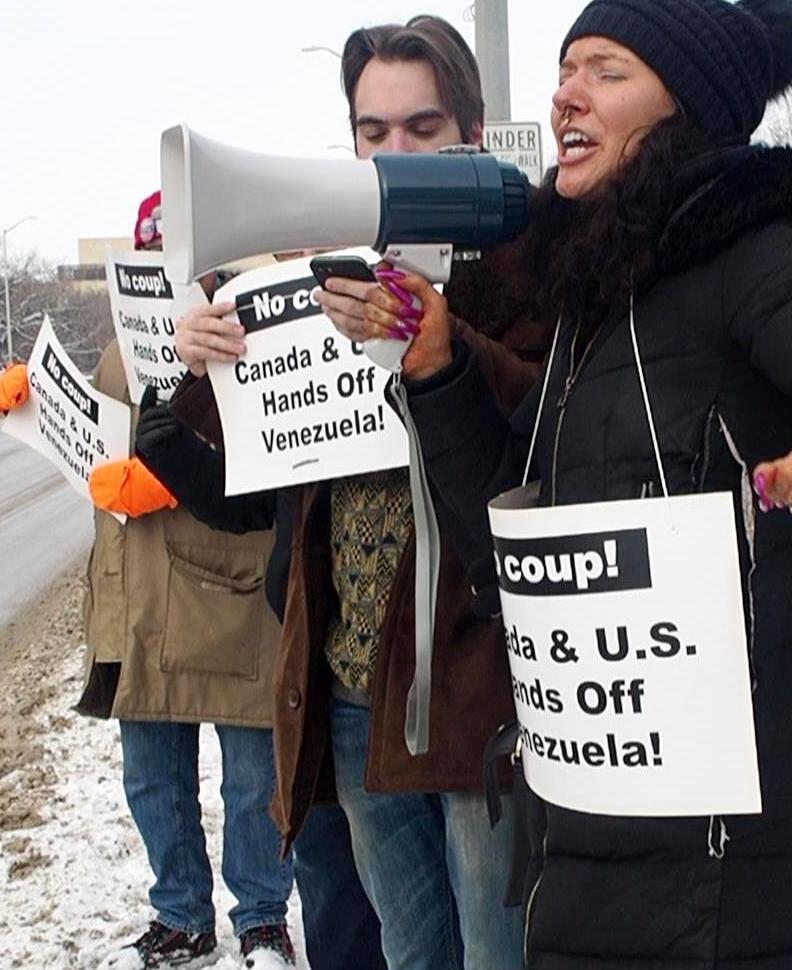
Edmonton, AB
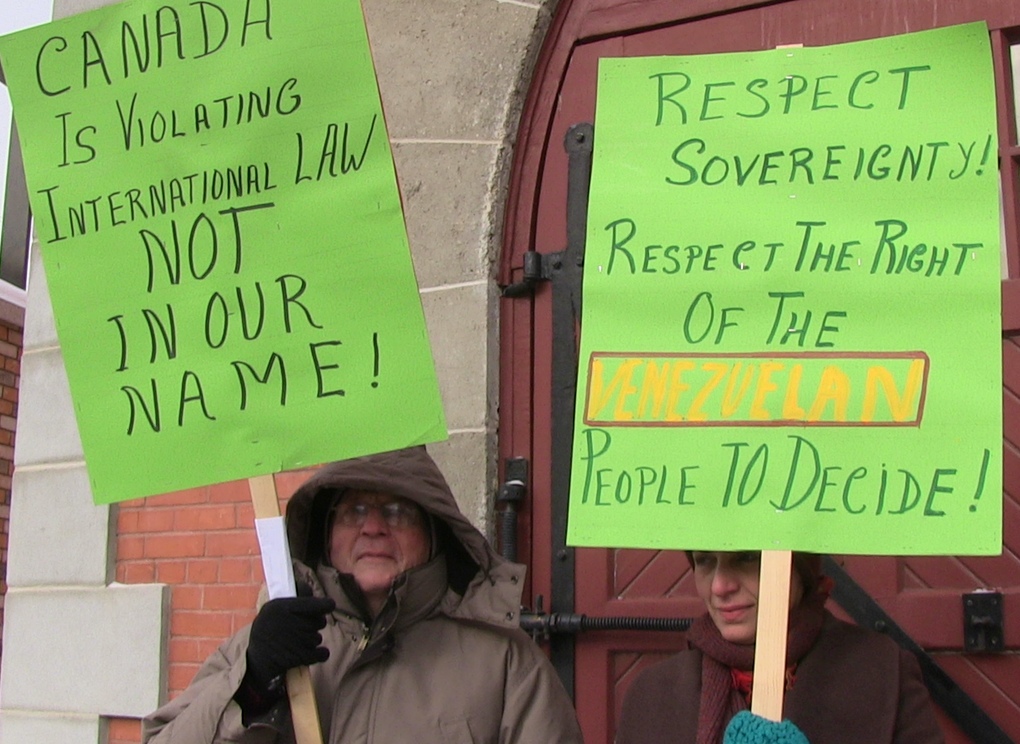
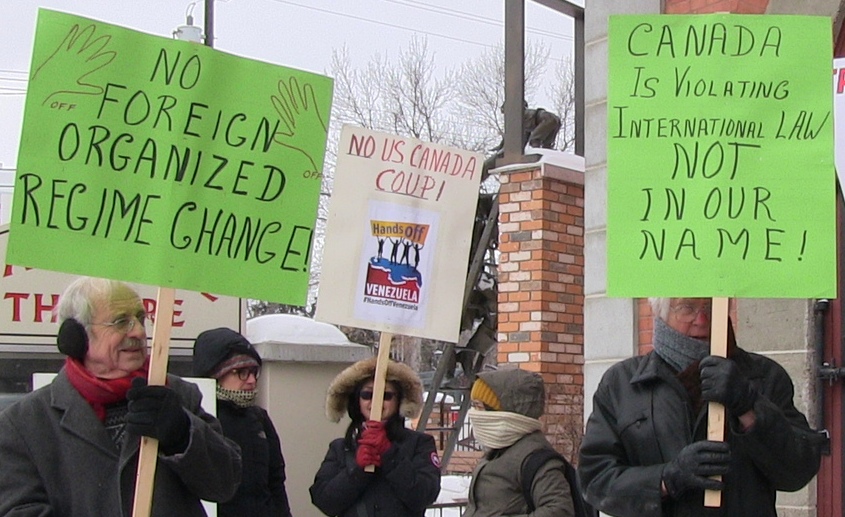
Calgary, AB
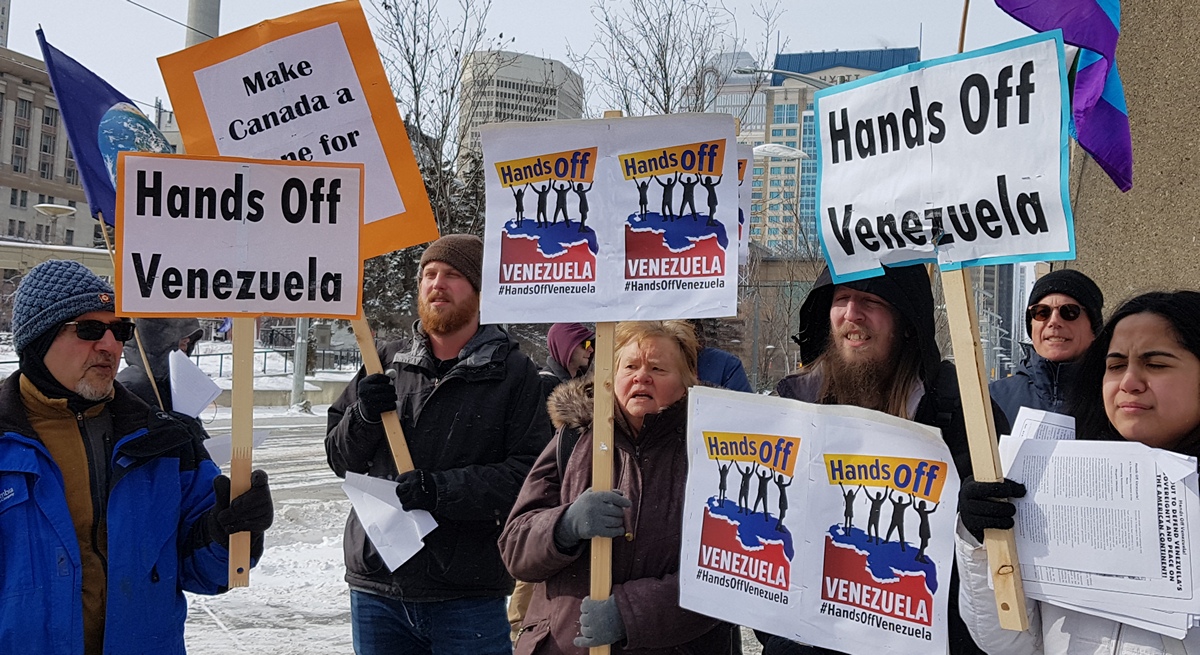
Vancouver, BC
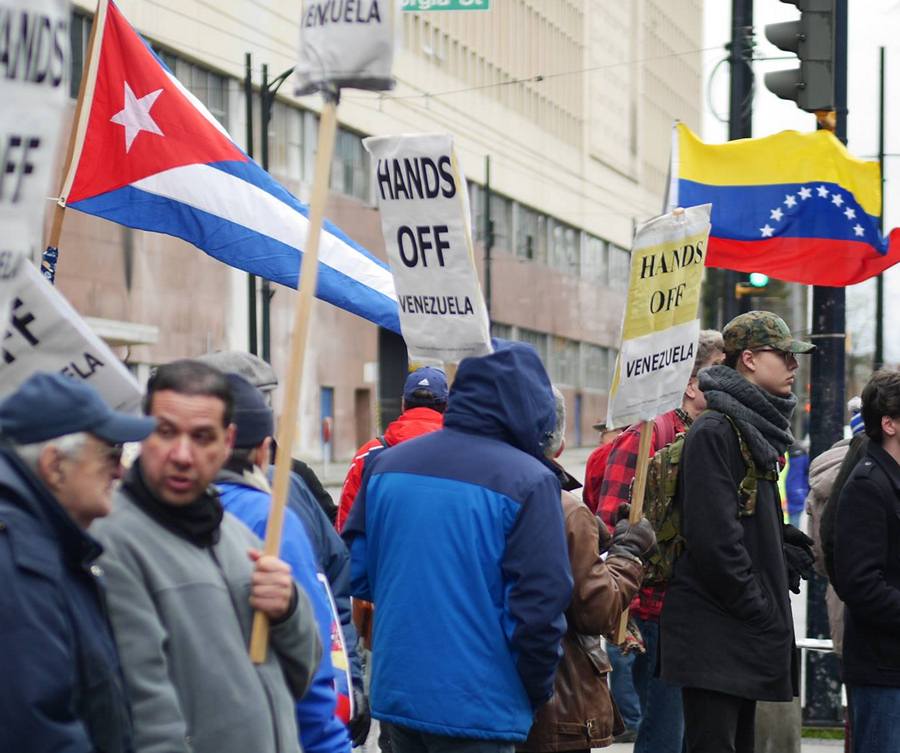
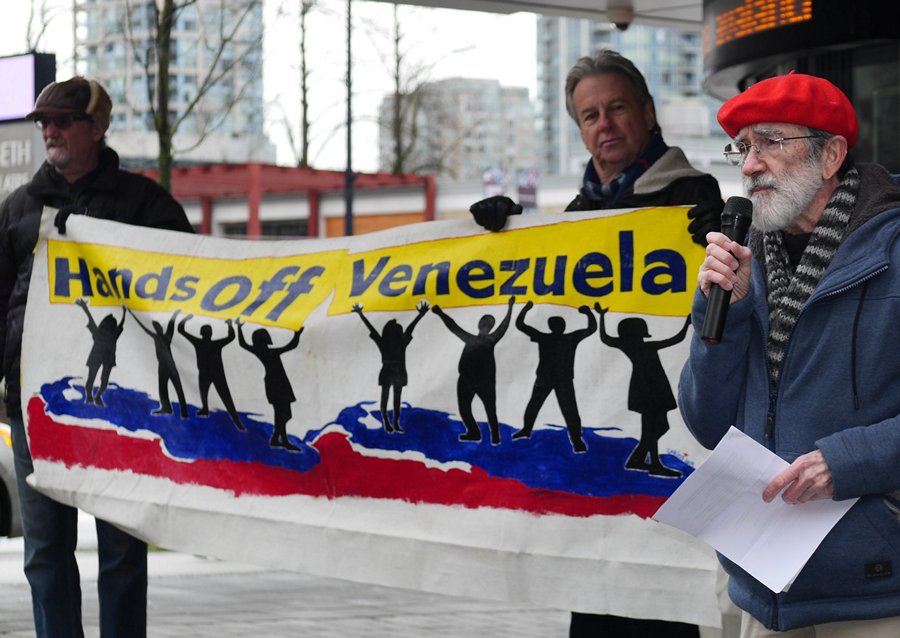
Courtenay, BC
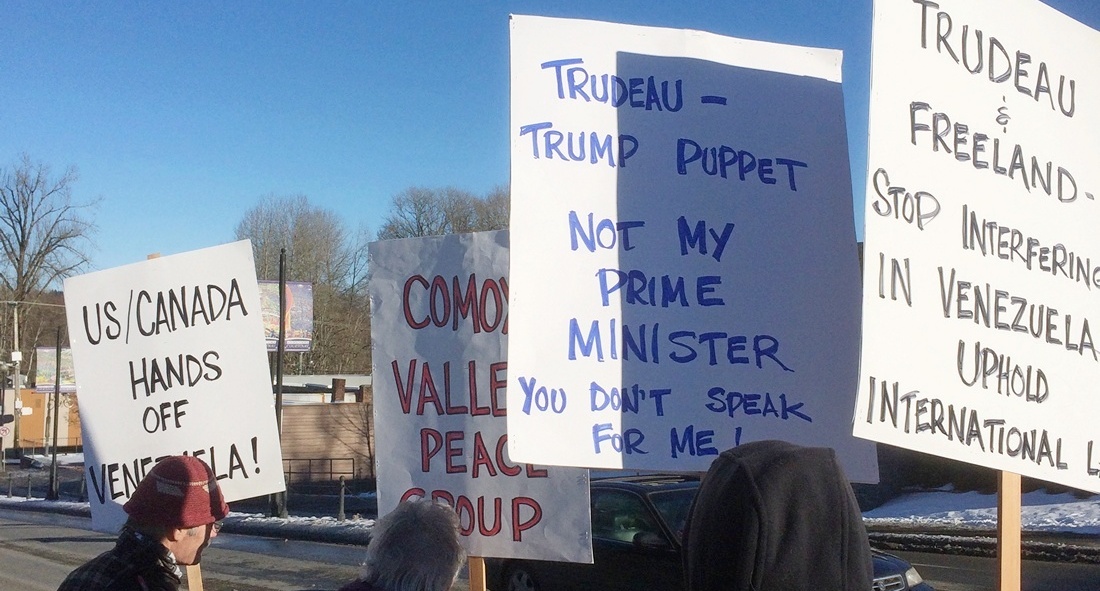
International
Asia and Oceania
Jeju, Korea
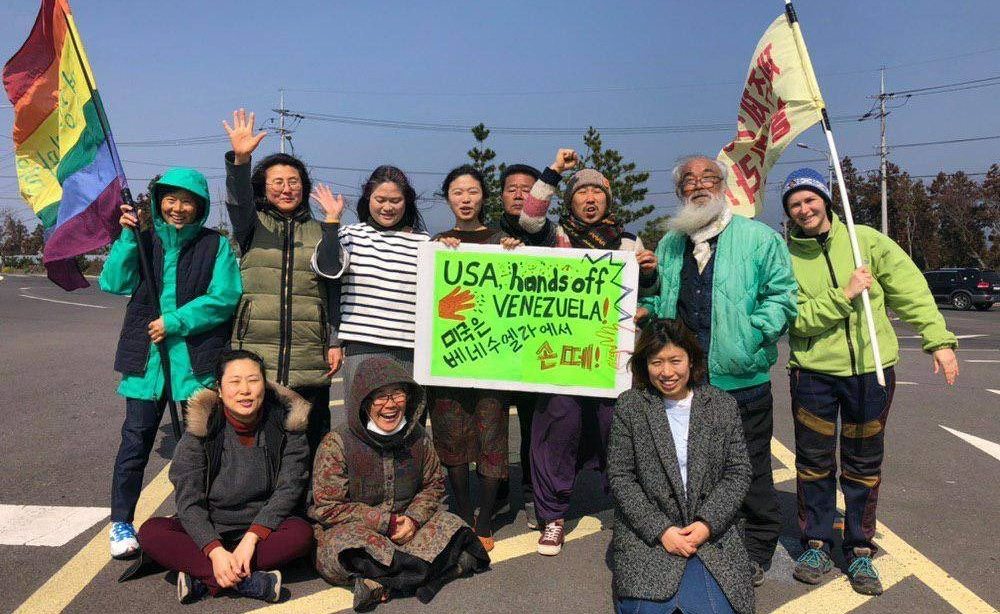
Manila, Philippines

Guinea Bissau
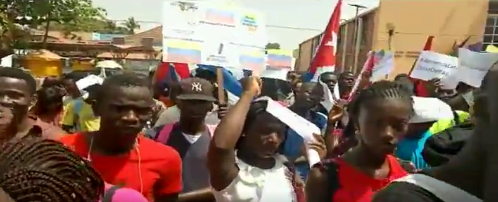
Mumbai, India

Sydney, Australia
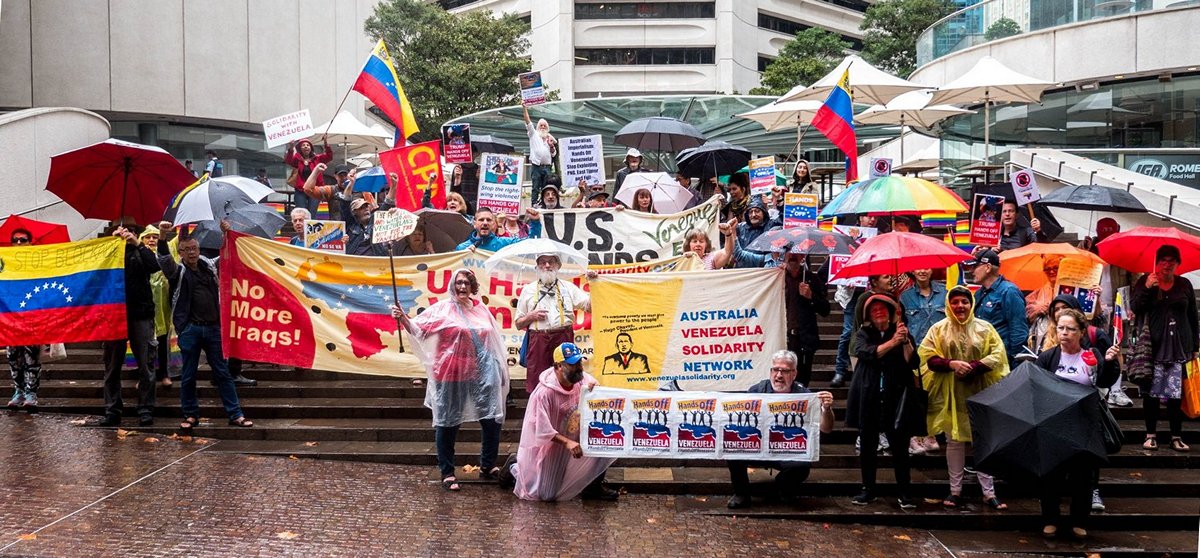
Brisbane, Australia
Latin America and the Caribbean
Bolivia, February 25
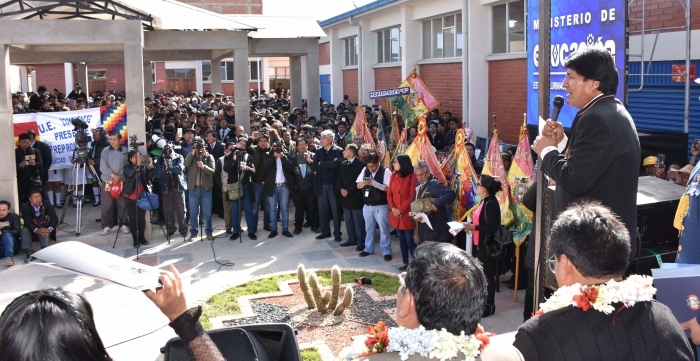
Bolivia, February 22
El Salvador
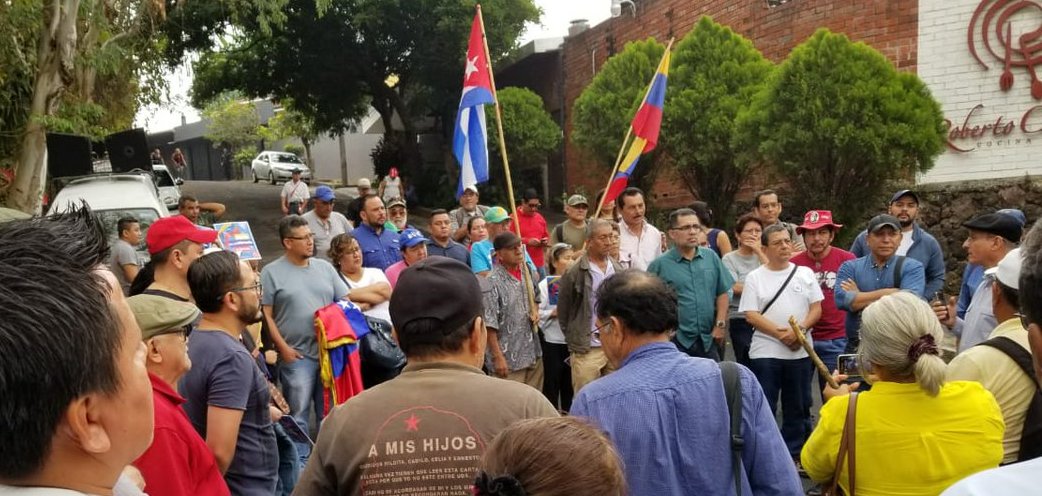
Cordoba, Argentina
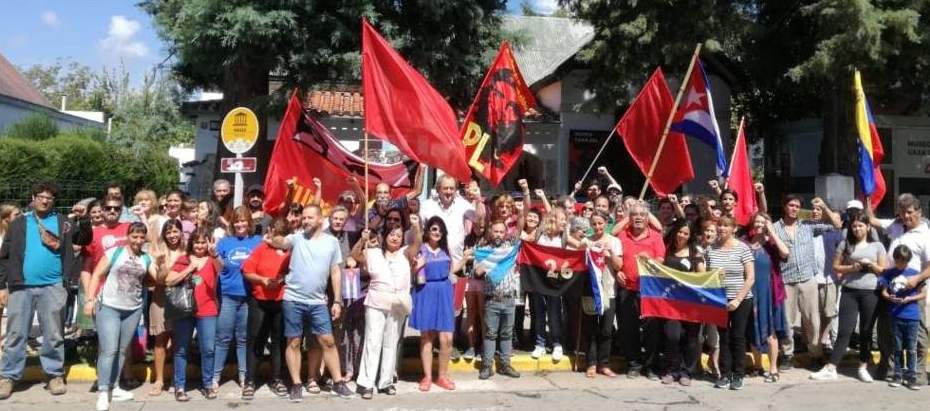
Santiago, Chile
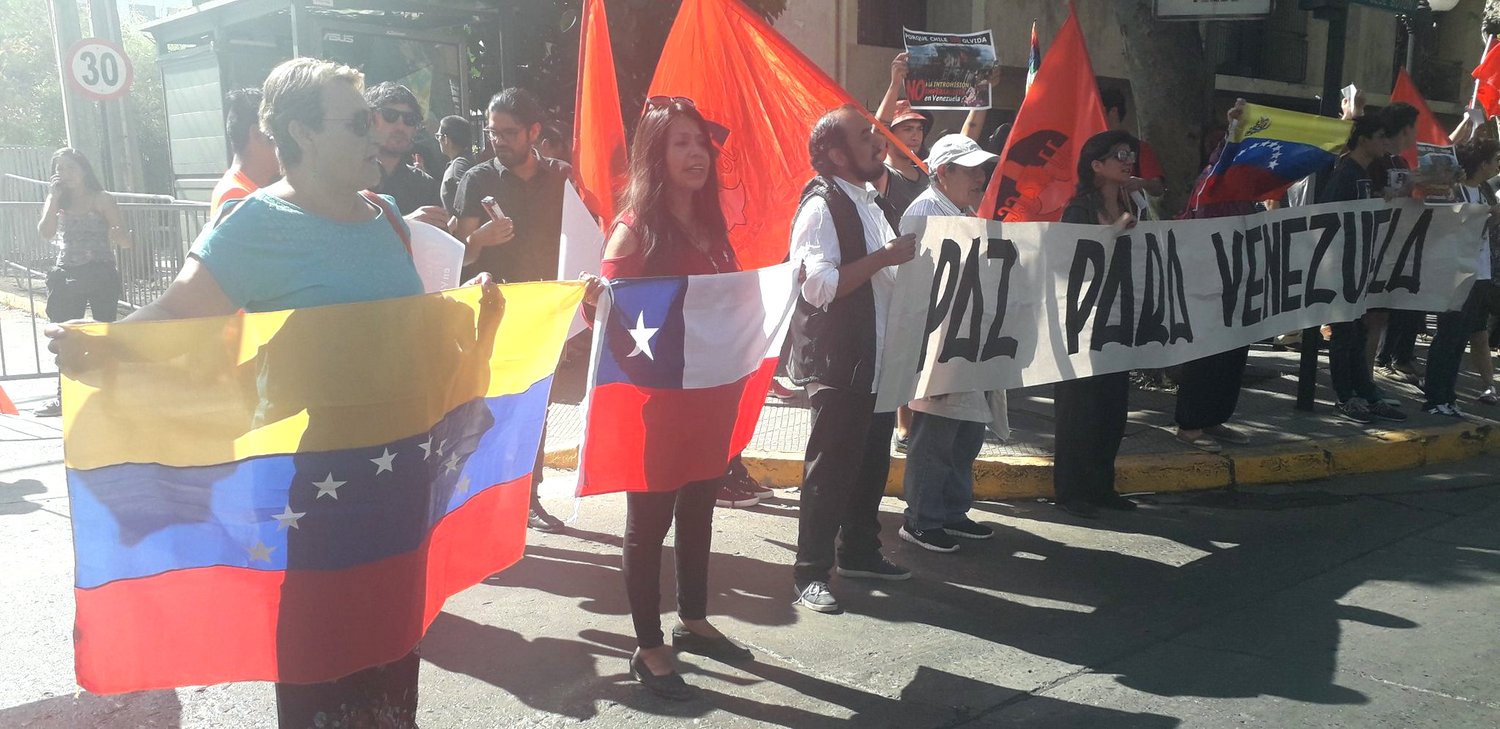
United States
Boston, MA
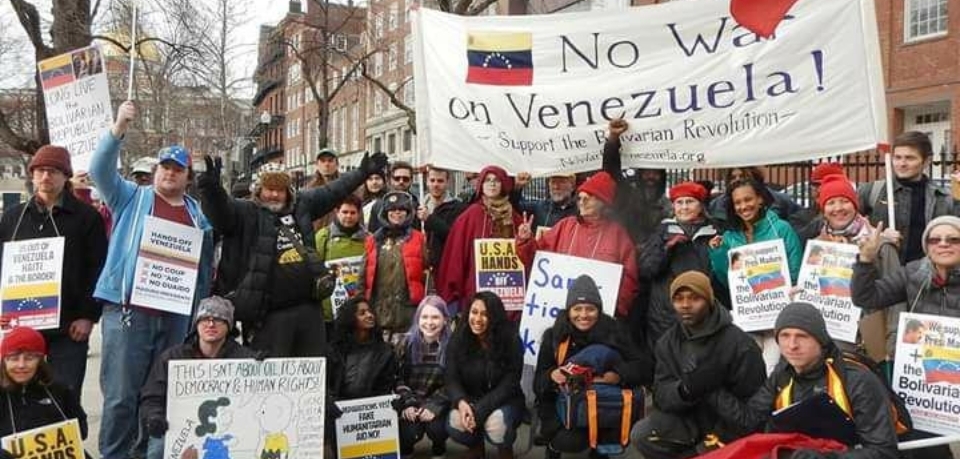
Baltimore, MD

Buffalo, NY

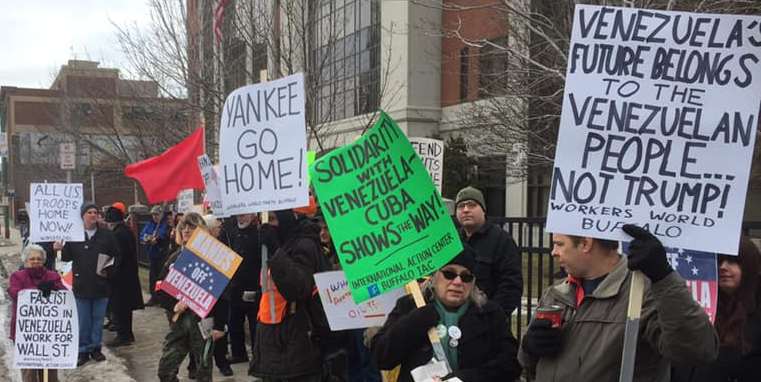
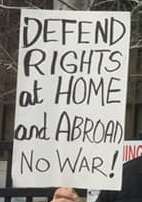
Syracuse, NY

New York City, NY

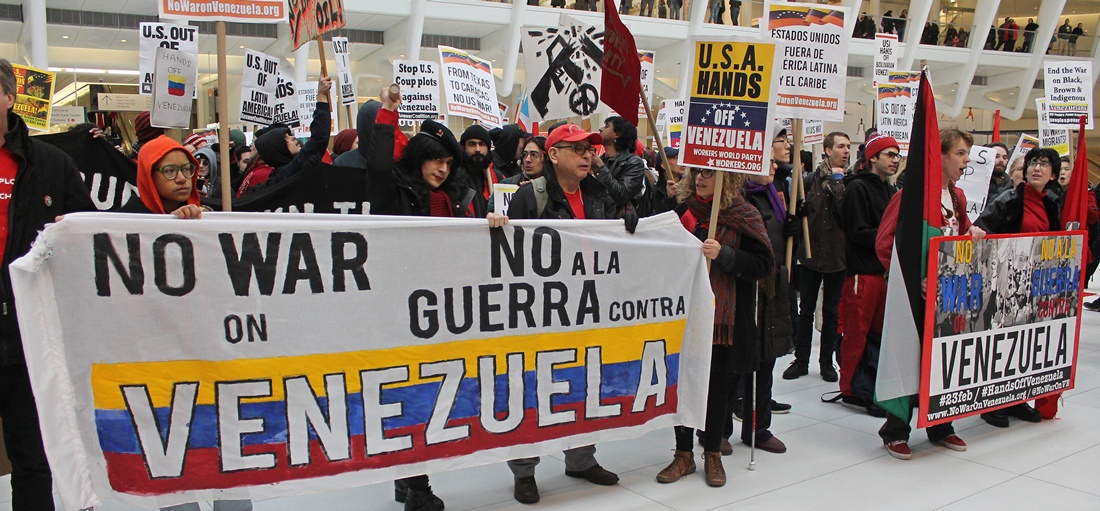
Detroit, MI
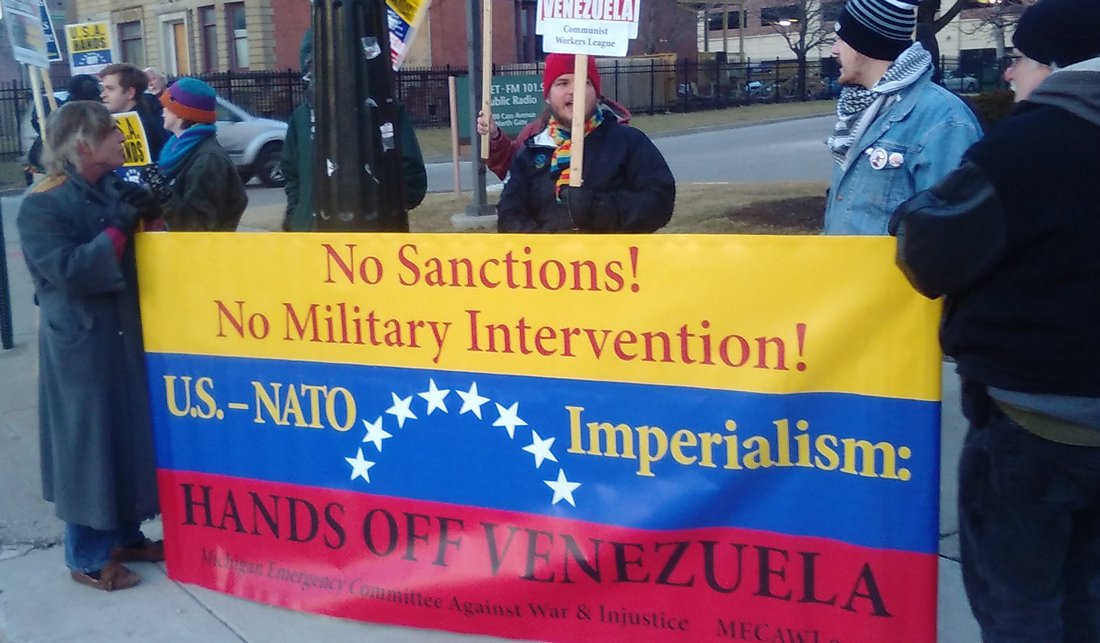
Philadelphia, PA

Madison, WI
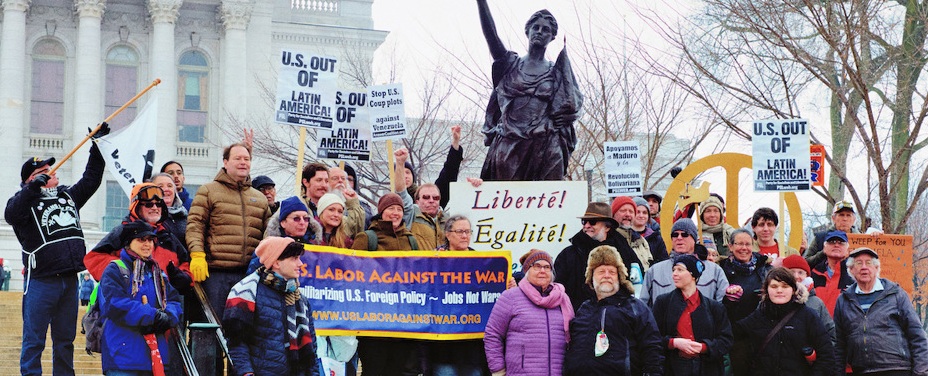
Milwaukee,WI

Minneapolis, MN
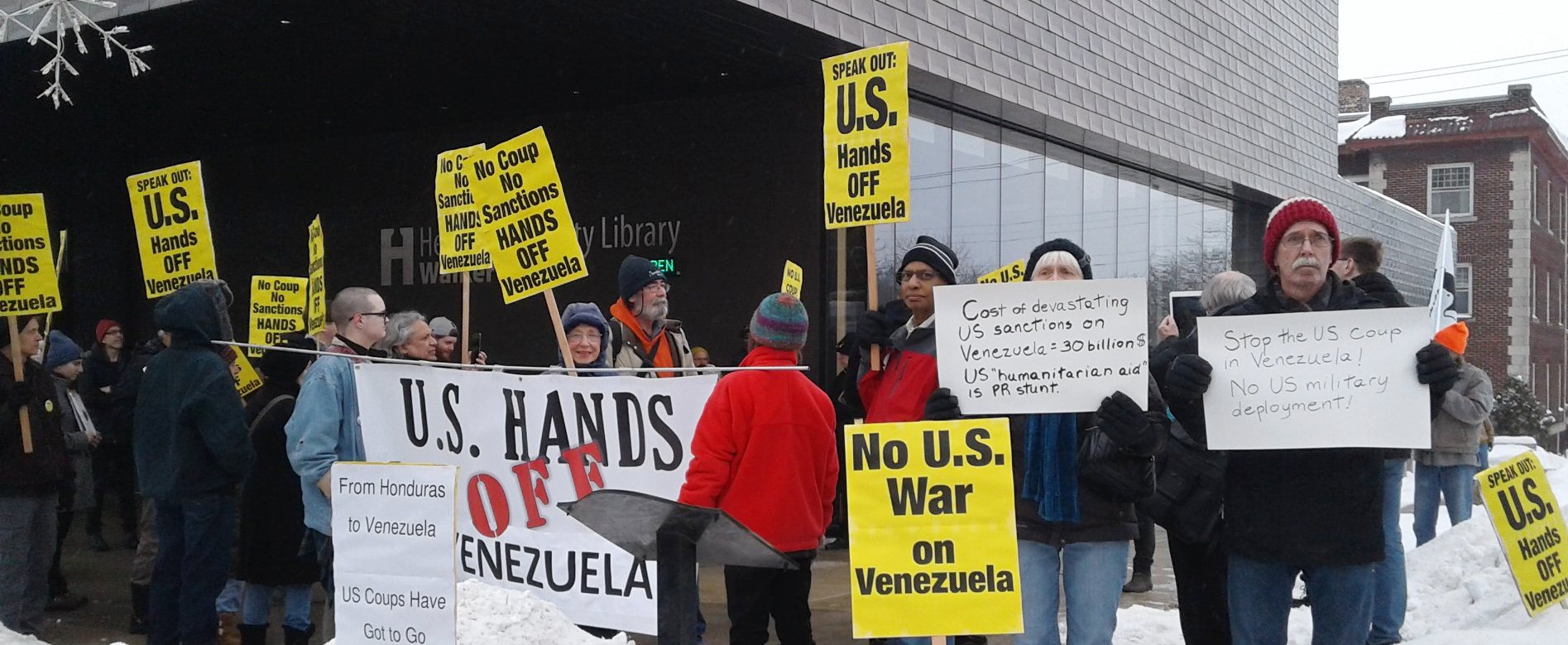
Tuscon, AZ

Ohio Valley, WV
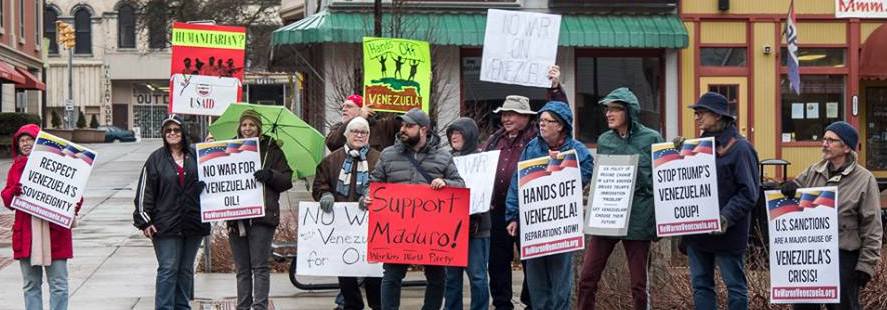
Charlotte, NC
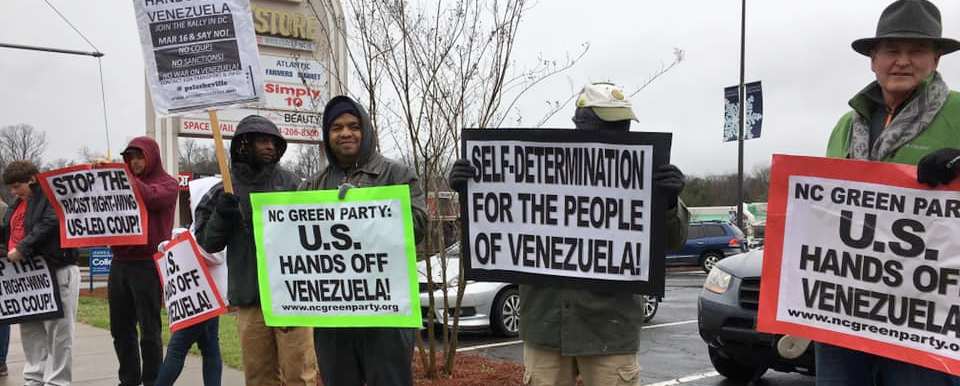
Houston, TX
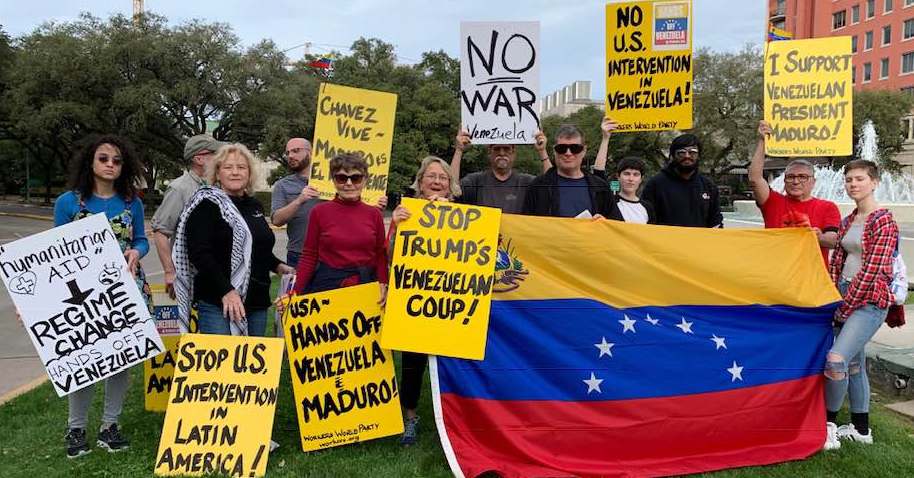
Miami, FL
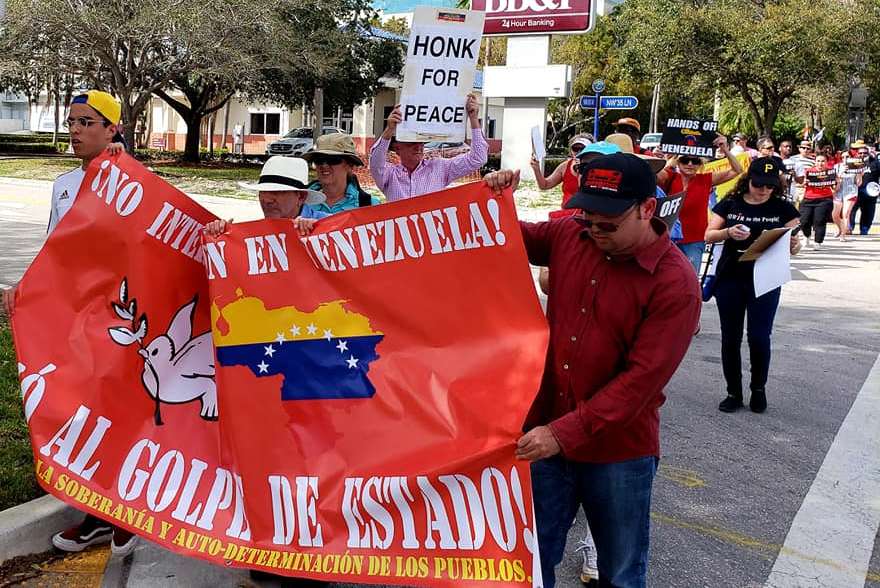

Denver, CO

Santa Monica, CA

Europe
Dublin, Ireland

Cork, Ireland

London, England

Liverpool, England
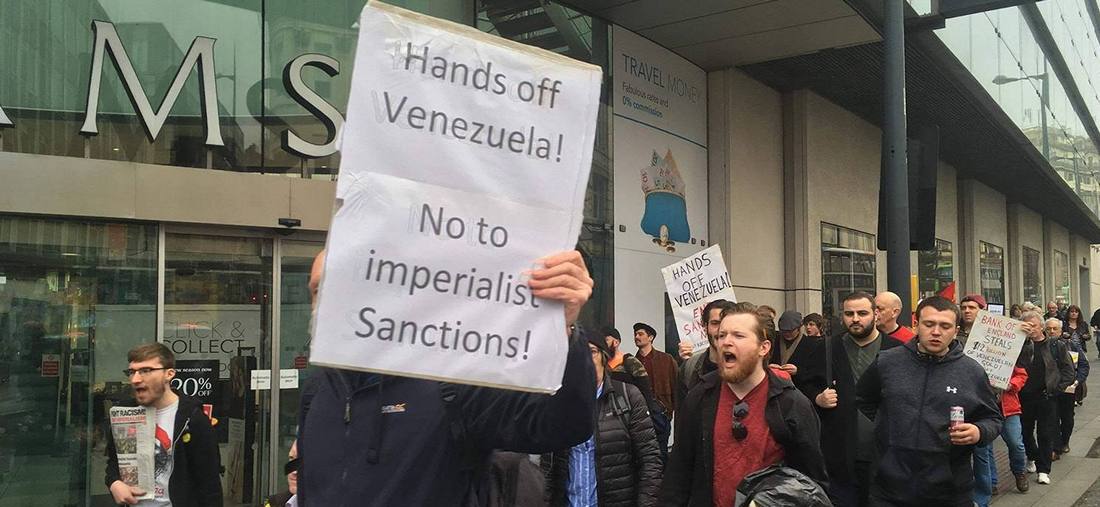
Amsterdam, Netherlands
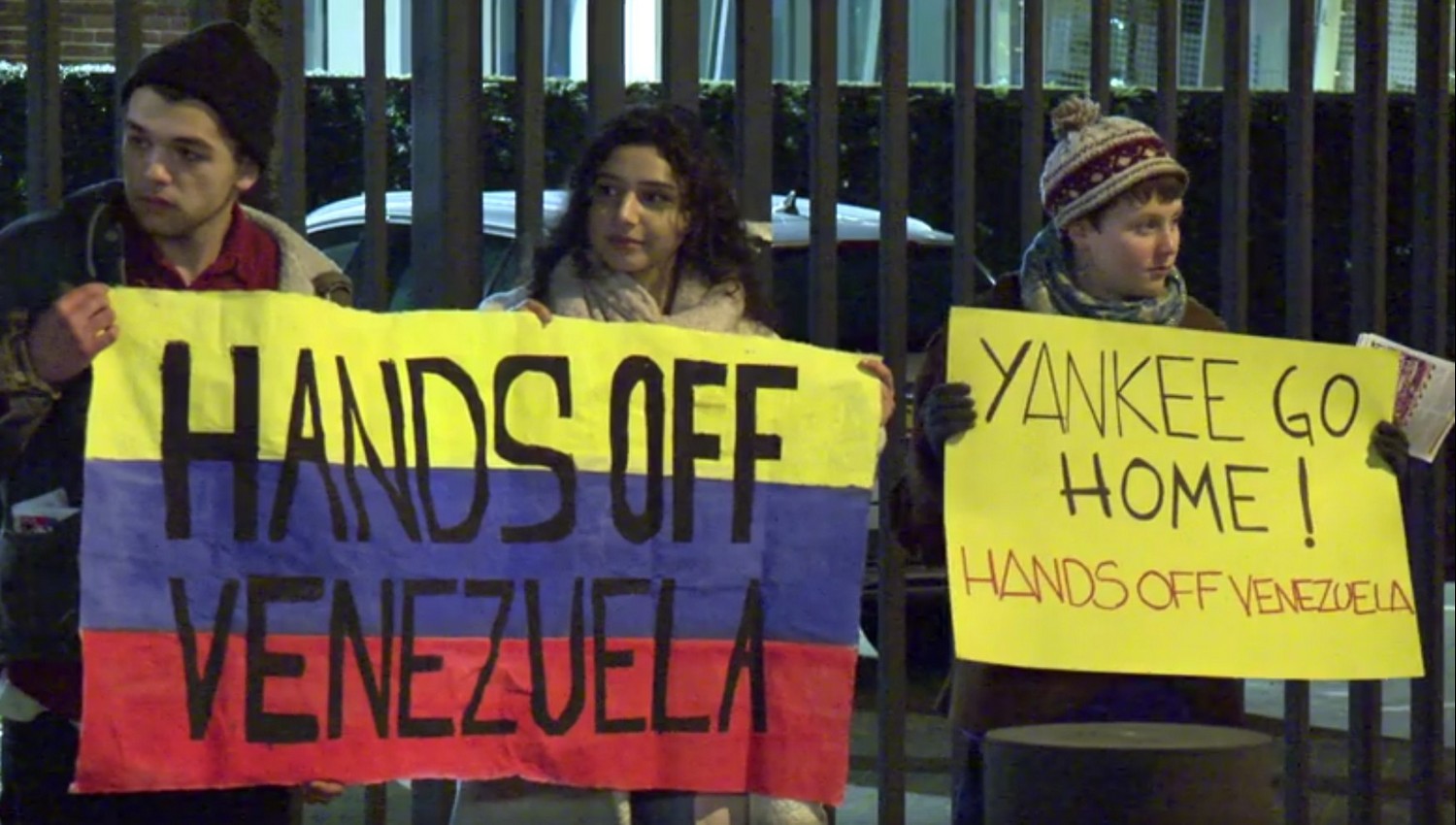
Brussels, Belguim
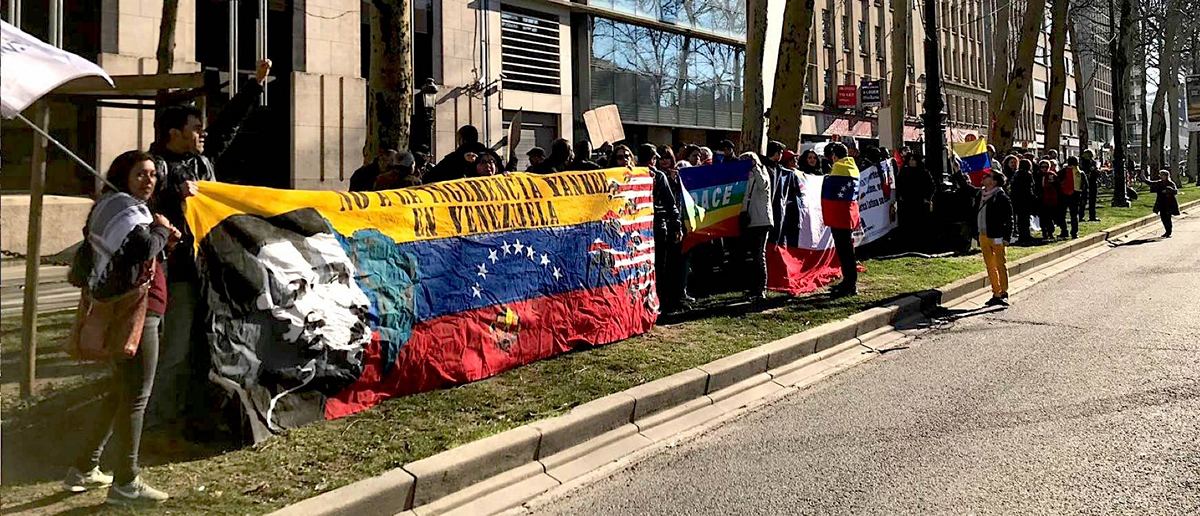
Stockholm, Sweden

Berlin, Germany
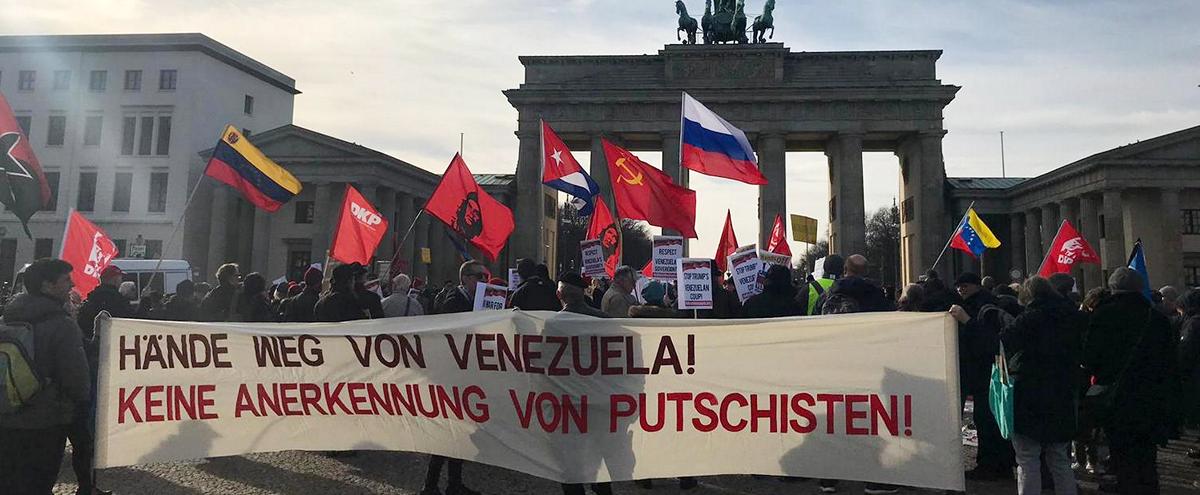
Hamburg, Germany

Asturia, Spain
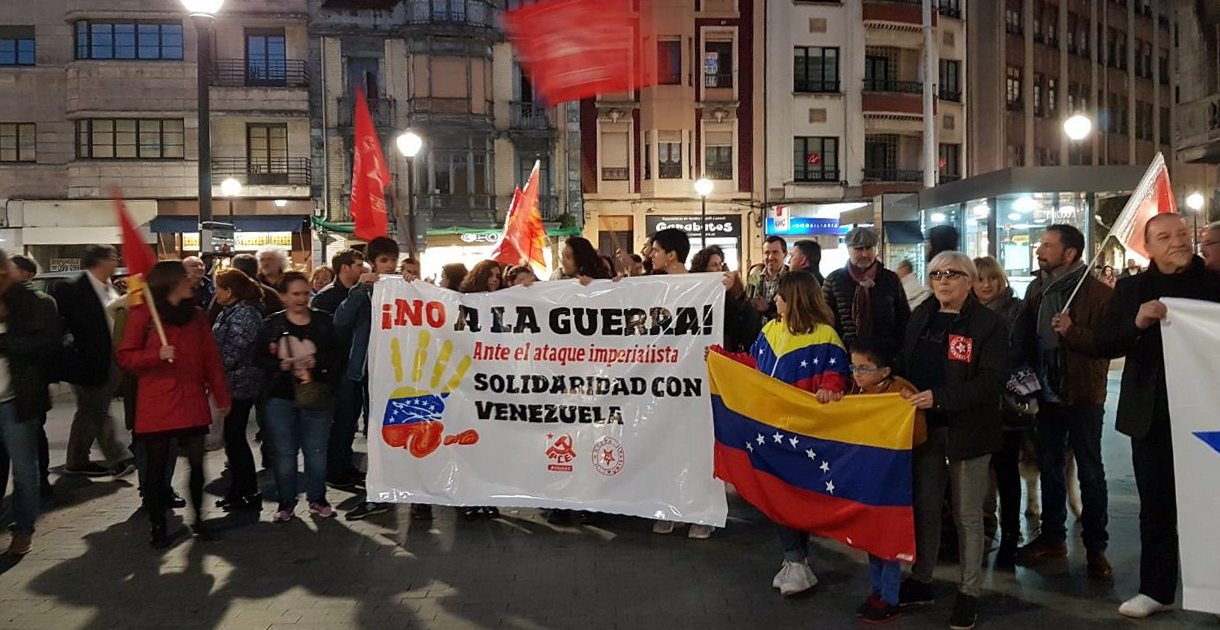
Rome, Italy
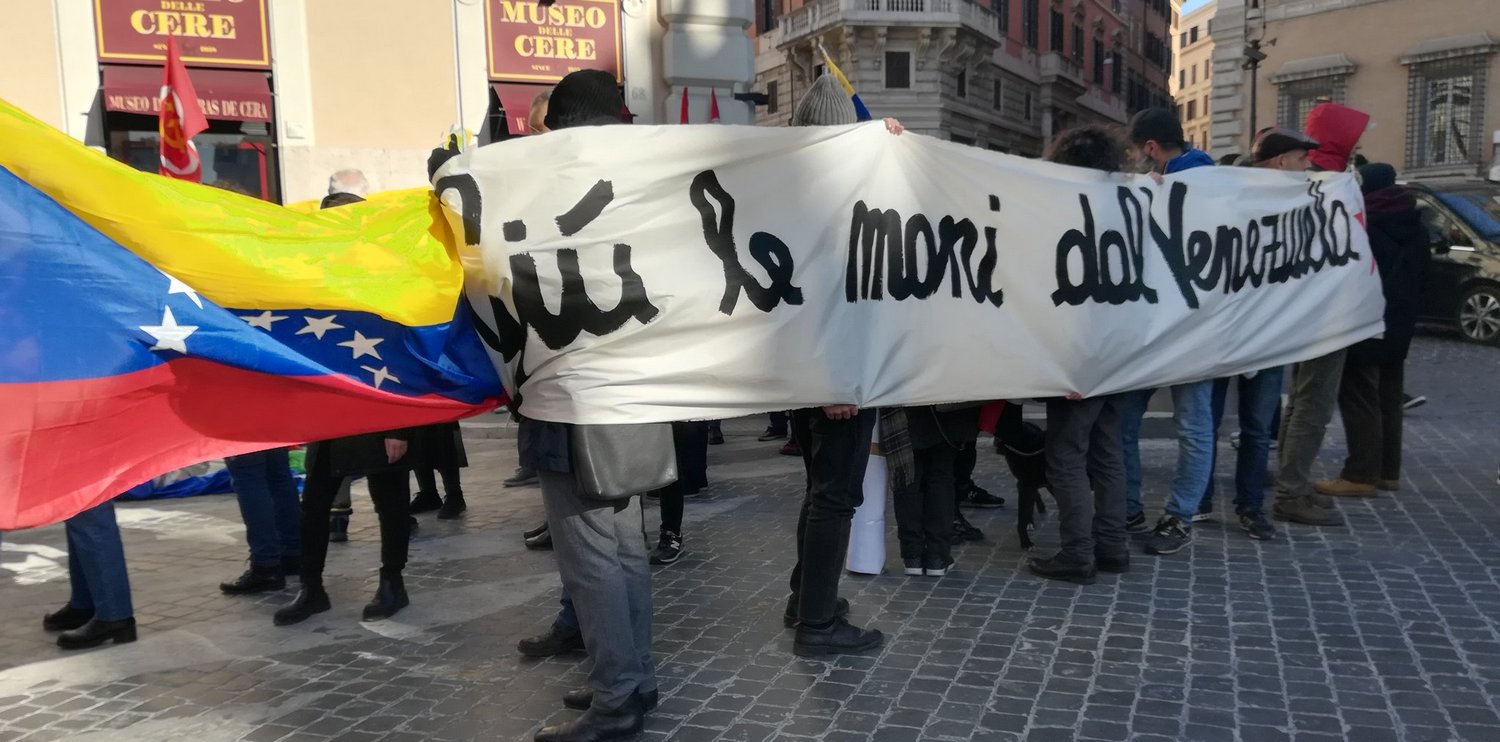
(Photos: TML, D. Penner, K. Jones, P. Graham. D. Gillan, No War on Venezuela, Hands Off Venezuela, PCFS, Green Left, JJCC, La Lucha, D. Lawvere, D. Boose, I. Martinez, Frente Independente Boricao, J. Catron, A. Azikiwe, WW, New Normal Photo, W. Bopm, K. De Franco, Ohio Valley Peace, NC Greens, G. Rubac, C.V. Nananjo, Denver Peace Council, IAC, LMS, World Peace Council, Venesol, Y. Gil, ARG provincia, Hamburg Venezuelan Consulate, PCE Asturia, J. Rily)
Statements, Letters, Commentary
U.S. and Canada
Must Stop Trying to
Overthrow
the Venezuelan Government
To be considered humanitarian, any international assistance offered to a country must be based simply on the notion that as human beings we should support one another when we are in need, not on ulterior motives. In the case of Venezuela today alleged humanitarian aid is being used to try to incite a civil war and foreign aggression led by the United States.
This was the case with incidents on February 23 when the U.S. and the unelected self-proclaimed "interim president" of Venezuela Juan Guaidó tried to force the entry of unauthorized goods into the country from neighbouring Colombia. The U.S. itself said its stunt at the border was in fact a test of Venezuela's military forces. What does this mean? The U.S. and Guaidó have been blackmailing and threatening Venezuelan armed forces members to turn their back on their duty to defend the constitution, and instead carry out a coup against the country's legitimate executive authority, including the President of Venezuela Nicolás Maduro. It did not work. It did not work because what the U.S. organized on Venezuela's border had nothing to do with humanitarian principles but was an attempt to create a trigger for a foreign invasion.
It is to Canada's shame that instead of trying to contribute to a calm and peaceful atmosphere for Venezuelans to resolve their problems internally without foreign interference, it rushed in on February 23 to repeat absurd accusations of U.S. officials who tried to blame the government of Venezuela for burning a truck -- said to be carrying aid, surrounded by provocateurs throwing Molotov cocktails -- on the Colombian side of an international bridge and with the permission of Colombian authorities.
The United Nations and the Red Cross both refused to participate in the U.S. operation citing its political rather than humanitarian motivation.
Venezuela is going through a severe economic crisis with high inflation and shortages of imported medicines and foods, largely brought on by a deliberate strangulation of the country's economy by those whose aim is regime change. Countries that do not have an embargo against Venezuela and its government can ship aid by air or sea as Mexico, Russia, China, Cuba, and others have done recently. Cuba in fact has also assisted by having over 18,000 health care workers in Venezuela. Venezuela is itself well known internationally for the development assistance it has provided developing countries, especially sister nations in the Caribbean. None of this aid was ever used to try to carry out regime change. Canada should follow this example.
The Venezuelan government has said it will accept aid delivered through the United Nations. The UN has worked out ways for Venezuela to import needed goods so that it does not come up against U.S. sanctions designed to prevent it from accessing international payment and loan systems controlled by U.S. financial institutions. Going through the UN system should also help countries and businesses involved in providing or shipping goods to Venezuela avoid the risk of incurring penalties from the U.S. for doing business with Venezuela. This shows how the U.S. blockades of Cuba and other countries work as well. It is a perverse form of collective punishment aimed directly at a nation's people, especially the most vulnerable, intended to pressure them to turn against their government. It not only violates international law but is profoundly inhumane and amounts to an act of war.
The humanitarian position today is to say End the suffocating economic blockade; No to regime change; and No to a brutal war of conquest in Latin America. It is to call for political solutions which start from recognizing Venezuela's sovereignty and independence and rejecting military solutions based on the use or threat of force, which is illegal! All support should be given to measures which promote dialogue between and amongst Venezuelans to resolve their differences in a peaceful manner and in accordance with their constitution.
(March 2, 2019)
Reply to the CBC
by Cuba's Ambassador
to
Canada, H.E. Josefina Vidal
On Sunday, March 3, the CBC ran a tendentious and manipulative article making slanderous claims about the relations between Cuba and Venezuela. The Ambassador of Cuba to Canada HE Josefina Vidal, sent the CBC the following fitting reply.
***
To the Editor of CBC News
I reject categorically and in the strongest terms the tendentious and manipulative article "Canada at odds with Cuba 'ally' over Maduro's fate," written by journalist Evan Dyer and published today, Sunday, March 3, 2019, by CBC News.
Good journalism does not speculate, it informs objectively.
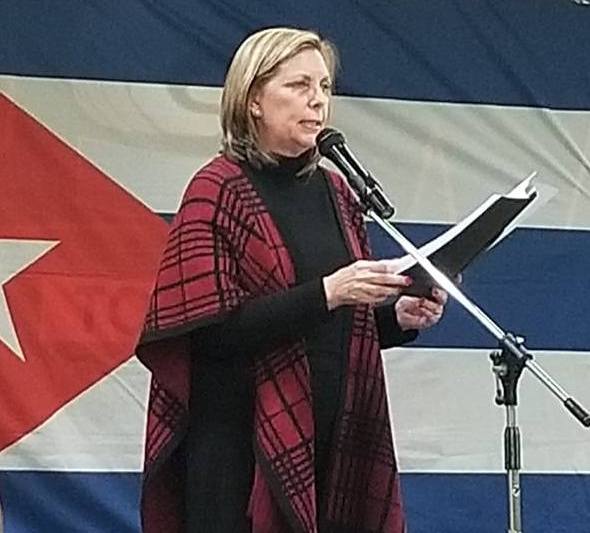 The assertion that thousands
of Cubans would allegedly
be
inserted into the structures of the armed and security forces of
Venezuela, holding the government of (legitimate) President
Nicolás Maduro, is a scandalous slander. I demand that CBC
News present a proof, which evidently it does not have, since it
does not appear in the whole article.
The assertion that thousands
of Cubans would allegedly
be
inserted into the structures of the armed and security forces of
Venezuela, holding the government of (legitimate) President
Nicolás Maduro, is a scandalous slander. I demand that CBC
News present a proof, which evidently it does not have, since it
does not appear in the whole article.
What Cuba has been offering Venezuela for many years is a modest cooperation, in which slightly more than 20,000 Cuban collaborators participate, 94 per cent of them health workers, others in education, as they do in 83 countries around the world.
It is unfortunate that CBC News plays into the hands of the government of the United States, whose President happened to accuse Cuba a few days ago of maintaining a "private army" in Venezuela, a statement that is vile.
It is regrettable that CBC News does not denounce the US government's military aggression plans against the Bolivarian Republic of Venezuela, and the fact that it openly declares that its ultimate objective is to overthrow the Cuban Revolution. What else to expect from a sinister character like John Bolton, who in 2002 organized the coup against Venezuela, while accusing Cuba of developing a biological weapons program at a time when the false pretext of the presence of WMD in Iraq was fabricated to launch the war against that country? The latter lie was quickly denied by the US Intelligence Community itself.
Let's hope that CBC News, with its biased coverage, does not support the aggression of the United States against the peoples of our America, and then apologize, as so many media organizations had to do after the war against Iraq. Our peoples will not forget.
As the Cuban Government recently stated, what is at stake today in Venezuela is "the sovereignty and dignity of Latin America and the Caribbean" , "the survival of the rule of International Law and the UN Charter" "and whether the legitimacy of a government emanates from the express and sovereign will of its people, or from the recognition of foreign powers". "History will severely judge a new imperialist military intervention in the region and the complicity of those who might irresponsibly support it".
Josefina Vidal
Ambassador of Cuba to Canada
Ottawa, March 3, 2019
CBC's Despicable
Attempt to Legitimate
Aggression and War
A recent news item, "Canada at Odds with Cuban Ally Over Maduro's Fate," written by Evan Dyer, is a continuation of CBC News' campaign of vicious lies and distortions about the struggle of the Venezuelan people who are defending their independence and sovereignty against foreign aggression.
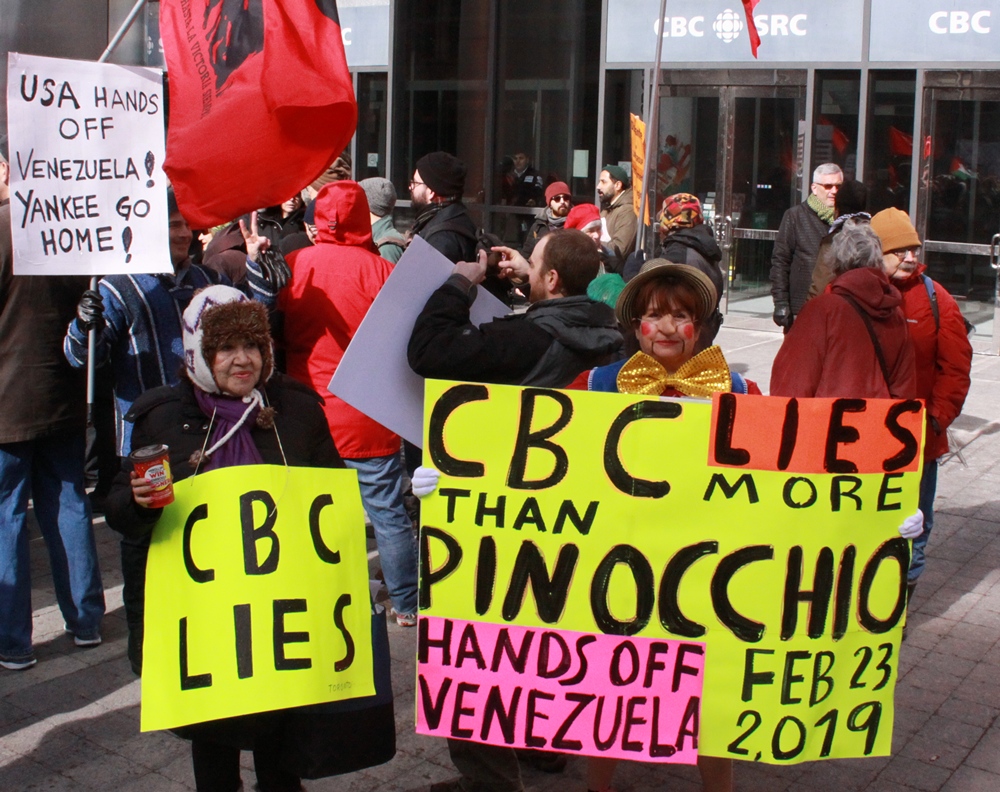 To call the CBC News
coverage yellow journalism is
inadequate
to characterize the dirty role it plays to justify aggression and
war against Venezuela.
To call the CBC News
coverage yellow journalism is
inadequate
to characterize the dirty role it plays to justify aggression and
war against Venezuela.
This latest baseless pack of lies and slander published on March 3, 2019, makes it clear that CBC News and Global Affairs Canada have become one, and that all pretence of basic journalistic integrity have been totally abandoned.
Dyer's diatribe, based on unsubstantiated statements from Foreign Affairs Minister Chrystia Freeland, states that "thousands of Cubans in Venezuela" are acting as "intelligence operators," and the "Cubans are calling the shots" to keep the government in power.
CBC News and Global Affairs Canada, having failed in their miserable attempt at a coup d'état and invasion to overthrow the Maduro government and not succeeding in their grand attempt to conjure up a mass uprising of the Venezuelan people and mass defections from the Venezuelan armed forces, now have as their Plan B blaming the Cubans!
Dyer's two-bit yellow journalism expects people to believe the preposterous claims that Freeland and her cronies are defending the autonomy of Venezuela against "Cuban domination." It would be funny if it were not so tragic to hear these calumnies which claim that Cuba is propping up the Maduro government while remaining silent about the scum the U.S. is propping up in that country.
The Trump administration's new point man for Venezuela is Elliott Abrams who, as a major architect of the so-called Iran-Contra dirty war, will be forever remembered for the crimes committed against the people of Nicaragua for which he was convicted in 1991. He was also accused of covering up many atrocities committed by the paramilitaries set in motion by the U..S government in El Salvador, Honduras and Guatemala.
The other key figure is National Security Advisor John Bolton who recently declared that the U.S. will invade Venezuela and imprison its president at the U.S. prison camp in Guantánamo.
Mr. Dyer forgot to inform us in his article that these are Chrystia Freeland's working partners who are dedicated to "defending the autonomy of Venezuela." Desperate to legitimate their plans to overthrow the Maduro government and to destroy the peace in the Americas by appeasing the U.S. imperialist invasion of Venezuela, they are concocting wild stories to cover up that the Venezuelan people are in control of their Bolivarian revolutionary process.
What the CBC is passing off
as journalism are stories
by the
U.S. imperialist political police. It is no accident that it
comes soon after Donald Trump gave the call to obliterate
socialism and that once he settles accounts with Venezuela,
Nicaragua and Cuba will follow.
Canadians will not stand for Canada's activities to trample the international rule of law in the mud. With this article, the CBC has wantonly abandoned journalistic integrity. CBC journalists and Canadians who listen to the CBC believing it to have integrity should be greatly alarmed to see what Canada's official news agency is doing. Political interference in how the CBC reports on the news is as intolerable as political interference which serves narrow interests in the judiciary or any other aspect of life. Virulent hatred for the people of Venezuela and their government will not make the U.S. imperialist plans to overthrow Maduro and take over Venezuela succeed. Canadians join the peoples of Our America to demand that Latin America and the Caribbean remain a Zone of Peace and that any conflicts be sorted out through dialogue and political negotiation, not flagrant lies, provocations and attempts to justify what cannot be justified.
(For the scurrilous CBC News article, click here.)
(March 4, 2019)
A Concert for Colombia
Let's start at the beginning and without detours. According to the European Commission, based on its own index (prepared by the Permanent Inter-Agency Committee of the Reference Group on Risks, Early Warnings and Readiness, INFORM), Colombia is the Latin American country with the highest risk of humanitarian crisis, above Guatemala, Mexico, Honduras and, of course, Venezuela.
A poor child in Colombia would have to wait 330 years on average to stop being poor, according to a report by the Organization for Economic Cooperation and Development (OECD). The passage of 11 generations is required.
One in ten children in Colombia suffer from chronic malnutrition, according to the United Nations Children's Fund (UNICEF). A report from the [Colombian] National Administrative Department of Statistics (DANE) indicates that 1,562 children died from malnutrition throughout the national territory between 2012 and 2016. According to the same UNICEF, 1 in 3 children live in multidimensional poverty conditions and half of all children under two years of age are in critical overcrowding.
Colombia ranks third, among 175 countries, with the highest rate of child homicide in the world, according to the latest report of the international NGO Save the Children for the years 2015-2017.
In the last 11 months, 162 human rights defenders and social leaders in 99 municipalities throughout the country were murdered, according to data from the Colombian Ombudsman's Office.
According to the latest Transparency International report, Colombia has worsened its Perception of Corruption Index, which is already in the 99th position of the 180 countries analyzed. Corruption in Colombia costs $18,400 million annually, according to the General Comptroller's Office of the State; that means something more than 5 per cent of GDP, or 15 per cent of the national budget.
In Colombia, attacks against journalists increased by 89 per cent between 2015 and 2018, according to the Foundation for Press Freedom. In fact, Colombia is (along with Mexico and Brazil) among the 14 leading countries in the world where murderers of journalists are not punished in the courts, according to the global index of impunity prepared by the Committee to Protect Journalists.
Colombia continues to be the country with the largest number of internally displaced persons in the world, with 7.7 million people in 2017, according to research published by the United Nations High Commissioner for Refugees (UNHCR).
Economically, the index of industrial activity in Colombia fell from 25 to 12 per cent of GDP between 1970 and 2016, according to figures from the Central Bank of Colombia. And, by contrast, banking assets have risen in recent years, reaching 48 per cent of GDP (the figure was 23 per cent in 1990), while 55 per cent of workers earn less than the minimum wage.
The Financial Action Task Force (FATF) warns of a very problematic situation in Colombia. In its latest report, it states: "the anti-money-laundering systems and tools and those against the financing of terrorism are not completely in line with the risk-based approach and there are important gaps in the supervision of activities." This report determines that Colombia has ignored the reality of the total amount of money laundered in the country. In a World Bank study, it was estimated that the volume of laundered assets in the Colombian economy amounts to 7.5 per cent of GDP.
For its part, in the democratic field, Colombia is the country in the region with the lowest level of electoral participation in all of Latin America. Between 1994 and 2018, the average number of abstentions for presidential appointments was 54.21 per cent. Two additional data confirm this weakness of the Colombian democratic system: a) in the plebiscite on peace accords, abstention was 62.57 per cent, and b) the popular anti-corruption referendum held in 2018 had an abstention rate of 67.96 per cent.
For all this, and for much more, Your Excellency President of the Republic of Colombia, Mr. Ivan Duque Márquez, I propose that you summon the Lima Group to try to obtain help for your country that, apparently, needs it according to the data of multiple international organizations. I suggest that you go to the United Nations or, if you prefer, to the Organization of American States (OAS), to find the relevant support for your country. And if none of this appeals to you, there is always a concert.
(CELAG, February 26, 2019. Translated from the original Spanish by TML)
Sanctions Against Venezuela
Chronology of a Strategy to Destroy Venezuela
Sanctions against Venezuela are real and palpable mechanisms of destruction of the State, its identity and, with it, of Venezuelan society. They form part of a war strategy based on the application of different resources and sophisticated tools of financial hegemony against basic aspects of our national life. Although in Venezuela there are no bombs falling and we don’t see any U.S. Marines disembarking along the coasts, there is plenty of evidence of the national and international resources of permanent aggression being used on the part of corporate and political sectors.
In this context, since 1999, the internal manoeuvres of anti-Chavismo have alternated between low-profile mechanisms such as boycott or corporate disinvestment and forceful actions such as the April 2002 coup or the oil lockout.
Since 2015, when the then president of the United
States, Barack Obama, declared Venezuela to be an "unusual and
extraordinary threat to the national security of the United States,"
the political vanguard and leadership of anti-Chavismo irrefutably
became the transnational elite that governs in Washington, giving
greater hardness to a string of measures that have led not only the
destruction of the national economy but also seriously modified the
cultural perception of the issue.
This is understood in its full dimension with the declarations of Jack
Lew, former Secretary of the Treasury during the Obama Administration,
who stated that "sanctions are the silver bullet of U.S. foreign policy
because they are more effective and cheaper for subduing enemies than
traditional power, because they have influence in the U.S. financial
markets, the central nerve of the globalized economy." Sanctions, thus,
are siege measures against fortresses, like in the medieval era,
updated for this new era of intelligent, technologized, globalized
power, where each nerve that is connected to that power functions to
make their enemies submit, according to Lew.
2015: United States Assumes Command of Anti-Chavismo
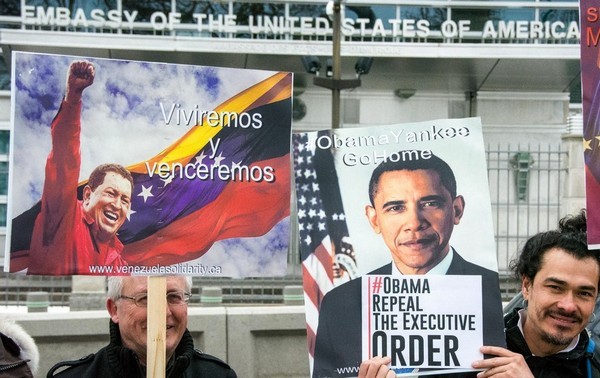
Ottawa, March 26, 2015.
The financial blockade has mutated from the attack on the debt, through isolation by the US financial system, to the application of espionage techniques that chase after Venezuelan transactions and withhold funds destined for the import of food and medicines.
Since then, Venezuela has suffered the effects of the fall in oil prices due to the fact that the United States agreed with Saudi Arabia to aggressively increase oil production in order to lower prices and affect important oil-producing countries such as Venezuela, Russia and Iran.
In addition, the economy began to deteriorate due to a lack of income and by the activities of a company created in Miami in 2010, called DólarToday, which artificially devalued the currency in order to induce an inflationary spiral. Venezuela lost approximately 60 per cent of its national income that year.
The Executive Order (13692) signed by the Obama Administration in March 2015 initiated financial blockade actions against Venezuela and, with it, the U.S. government made the economic attack against the country legal, based on the Emergency Law of International Economic Powers, activated at the constitutional level, to provide whichever administration with tools to "defend" itself from the threat.
Under this pretext, the White House placed its financial system, through the Treasury Department, on alert with respect to Venezuelan financial operations.
With the excuse of blocking the movement of unverified personal accounts of, up to that point, seven Venezuelan officials, this legal instrument has prohibited the Venezuelan state’s use of the U.S. financial system for importing food and medicines.
At the same time, risk-rating agencies, agencies created by the United States to destabilize sovereign countries, published a global map of "risky countries". This is to supplement the economic-financial siege against the Venezuelan government's recovery plans, as a result of the fall in oil prices.
Venezuela was catalogued by the French financial company Coface as the country with the highest risk in Latin America, similar to African countries that are currently in situations of armed conflict. The "study" was carried out based on the negative ratings of the three major U.S. rating agencies, Standard and Poor's, Fitch Rating and Moody's, which were largely responsible for the global financial collapse of 2008.
From 2015 onwards, the country-risk variable began to increase artificially in order to hinder the entry of international financing and, until the first half of 2018, these three major rating agencies have stepped up their attacks against Venezuela, taking no account of the on-time Venezuelan debt payments, in order to push the country towards default and project a situation of insecurity for potential foreign investment.
In this context of a siege based on social discontent produced by the fall in oil prices, scarcity, shortages and a wave of looting, anti-Chavismo won the majority in the National Assembly and set a higher stage, now from the National Assembly, for financial aggression against Venezuela.
2016: Financial Siege and the Default That Did Not Happen
In April 2016, the International Monetary Fund warned of the "economic catastrophe" in Venezuela through a report, generating expectations of collapse, inflation and scarcity to legitimize the actions of economic warfare carried out by Fedecámaras and Consecomercio, Venezuela's two main associations of the private sector.
The National Assembly, in contempt for incorporating three deputies whose elections were demonstrably fraudulent, approved legal instruments in May and August that declared "null" the oil contracts, foreign investments and the incurring of new debt on the part of the country, trying in this way to prevent fresh money from entering the State coffers.
During 2016 and 2017, Venezuelan accounts in the United States were closed by large private banks, such as Citibank and JP Morgan, because Executive Order 13692 empowered the Treasury Department to use surveillance mechanisms for Venezuela's financial transactions in the United States.
With the excuse of protecting its financial system from "corrupt officials," the aim was to isolate Venezuela from the U.S. financial system and obstruct both its imports and the payment of foreign debt. Commerzbank, Germany's second-largest bank, joined in.
In July 2016, the country risk index EMBI, created by JP Morgan Bank, placed Venezuela with the worst score in the world (2640 points) below countries at war like Ukraine, even though the Venezuelan state paid $6 billion in foreign debt that same year. In September, PDVSA made an offer to swap US$7.1 billion in bonds in order to ease its payments, and the three major U.S. risk-rating agencies sought to frighten investors by declaring default if they agreed to Venezuela state-owned oil company's proposal.
In November, JP Morgan issued a false default alert on an alleged PDVSA debt default of $404 million to generate fear in the financial world and damage the image of the state-owned company. The US oil company ConocoPhillips also sued PDVSA before a Delaware court for its bond swap operation in order to frighten the participants and thus make the operation fail.
In this aggressive environment against the Venezuelan economy, inflation through the DólarToday effect closed at approximately 800 per cent, according to figures leaked to some international agencies.
2017: Embargo, Failure of Violence and Further Destabilisation

May 22, 2017, burning of public transit buses during escalation of
violence by anti-Chavismo forces.
In April 2017, the illegally elected president of the National Assembly, Julio Borges, demanded that more than 20 international banks cease their economic and financial ties with Venezuela. In May, he declared the purchase of US$865 million in PDVSA bonds by the U.S. bank Goldman Sachs, "null".
In his eagerness to coordinate financial and economic sanctions against Venezuela, and using the National Assembly as an instrument to legitimize the financial blockade, Borges met with the then White House national security advisor General H.R. McMaster. In this way the financial blockade prevented the country from importing food and medicines necessary for its survival.
Supported by the United States and the Organization of American States, Venezuelan anti-Chavismo undertook a new escalation of chaos and violence more intense and dangerous than that of 2014, which caused millions of dollars in losses to the country and left a lamentable toll of 130 dead and thousands injured. Likewise, the United States sanctioned more than 20 Venezuelan officials, representatives of all public powers and those responsible for maintaining internal order, as a measure to feed the chaos of the violent street protests (guarimbas).
As an extreme measure, President Nicolás Maduro
called
in May for the election of a National Constituent Assembly (ANC),
whose election took place in July amid intense violence. More
than 8 million Venezuelans participated in the election and with
it a traumatic scenario of violence was brought to an end. The
country regained political and social stability in the face of a
cycle of aggressions aimed at removing President Nicolás
Maduro and destroying the current constitutional framework.
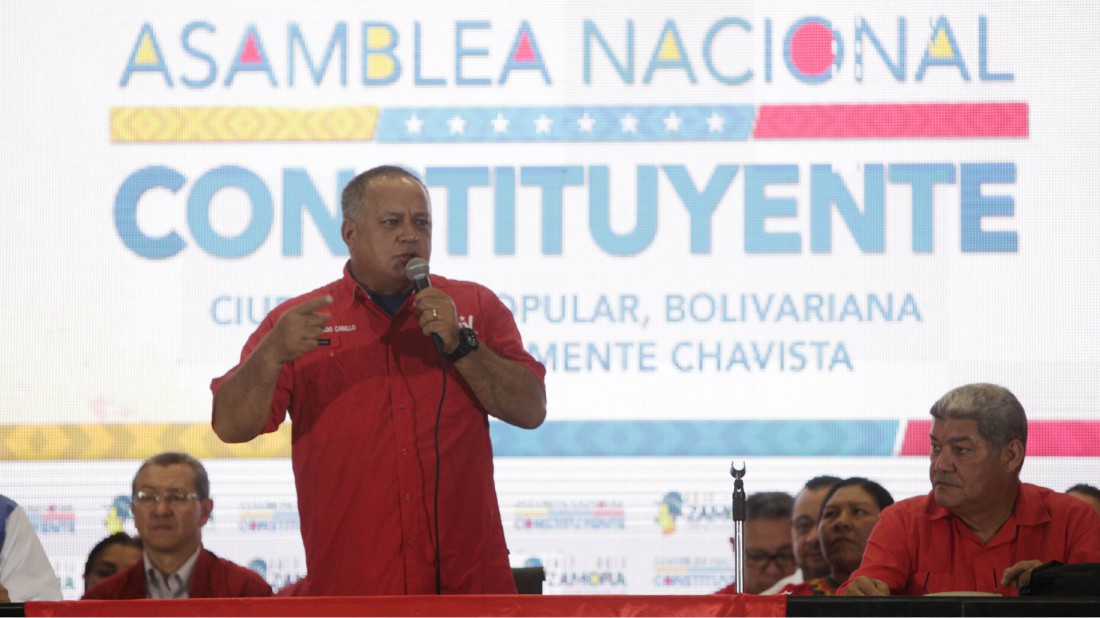
In May 2017 elections were called for a National Constituent Assembly.
2017 After the National Constituent Assembly Election:
Interfering Virulence
The days between August and November were the most dynamic in terms of the aggression against Venezuela that year. When the guarimbas failed, Europe entered the destabilizing game; in August the Swiss bank Credit Suisse prohibited its clients from carrying out financial transactions with Venezuela, as Julio Borges had requested in April.
In an executive order, Trump prohibited the purchase of Venezuelan debt and the repatriation of dividends from CITGO, PDVSA's U.S. subsidiary, thus closing two key financing channels for a Venezuela devastated by the guarimbas.
The U.S. then began executing an undeclared oil embargo. U.S. private banks, pressured by the Treasury Department, refused to issue letters of credit for the purchase of Venezuelan crude oil, thus negatively affecting the nation's revenues.
PBF Energy, one of the largest refineries in Venezuela, had to give up its economic ties to the country as a result of the sanctions.
In September, the Treasury Department, through its Financial Crimes Control Network (FINCEN), issued an alert called "red flags" that imposes a surveillance and control system on Venezuela's financial transactions to prevent the payment of food and medicines while, as a result of Trump's sanctions issued in August, CITGO began to have difficulties acquiring crude oil for its refineries and keeping its operations stable.
In this context, some 300,000 doses of insulin paid for by the Venezuelan government did not reach the country because Citibank boycotted its purchase. At the same time, the disembarkation of 18 million Local Committees for Supply and Production (CLAP) food boxes into Venezuela was interrupted by the obstacles imposed by the U.S. financial system, given that its authorities closed 52 Venezuelan bank accounts in entities such as Wells Fargo, East and City, because of their owners supposed links to the Venezuelan government.
While this was happening, regional elections were held with more than 11 million votes cast in the process. Chavismo won 19 out of 23 governorships in elections called by the ANC in which anti-Chavismo political parties such as Acción Democrática and Voluntad Popular participated.
In spite of this, even though in the last three years Venezuela never stopped honouring its international commitments, in November the European company Euroclear, founded by JP Morgan, decided to withhold $1.65 billion that were destined for the purchase of food and medicine.
The Americas Committee of the International Swaps and Derivatives Association (ISDA) declared Venezuela in default, ignoring the payment of $70 billion in debt in the previous two years. Meanwhile JP Morgan again increased Venezuela's country-risk to 2,989 points, the worst figure since 2014, when it stood at 1,458 points.
Risk-rating agency Standard and Poor's declared Venezuela in "selective default" because it was unable to honour debt commitments because the sanctions limited the country's financial transactions in the U.S. payment system. With these manoeuvres they tried to open the door to the confiscation of PDVSA's assets.
That same November the U.S. bond manager Wilmington Trust accused Corpoelec (Venezuela's national electricity company) of not cancelling debt interest in the order of $27 million, just when the country was experiencing a total blockade of its means of payment in the U.S. financial system.
So much so that a shipment of Primaquina, a medicine used to treat malaria, did not enter the country because of the blockade of a Colombian laboratory called BSN Medical, and 23 operations in the international financial system were returned: a total of $39 million for food, basic supplies and medicines.
In December, 19 other Venezuelan bank accounts abroad were arbitrarily closed by U.S. banks, preventing payments to creditors, while Venezuela's right-wing opposition decided not to participate in the municipal elections after its defeat in the October regional elections. Chavismo again won by a landslide, gaining more than 95 per cent of all mayors.
2018-2019: A Colossal and Multifaceted Attack
In January 2018, the current CIA chief and U.S. Secretary of State Mike Pompeo said at a conference at the American Business Institute that the financial sanctions against Venezuela had been coordinated by him directly with President Trump.
At the same time, eleven Venezuelan and PDVSA bonds, worth $1.241 billion, could not be paid to their creditors because of the obstacle of the sanctions. The National Assembly (still in contempt) passed a motion in which it criminalized the Venezuelan cryptocurrency the Petro, confirming its desire to keep the country without sources of financing.
In March, the Trump Administration, by executive order, declared illegal the purchase or other operations related to the Petro by U.S. companies and citizens. With this manoeuvre it legalized the agreement of the National Assembly affecting the initial pre-sale and the resources that would enter the country in a context where another $2.5 billion belonging to Venezuela were retained in U.S. banks. Much of this money was to be used to pay international creditors.
In that month, fifteen Venezuelan boxers were unable to travel to the 2018 Central American and Caribbean Games (CAC) qualifying event in Mexico due to the financial sanctions that prevented the processing of payments for logistics. Once this stumbling block was overcome, the next drama was that Colombia blocked its air space for these boxers to make the trip.
The Colombian government blocked 400,000 kilos of food
in
CLAP boxes that would enter the country to strengthen this food
program by which more than 6 million families are fed
throughout the country.

Former Colombian President Juan Manuel Santos announced at a conference
the theft of 400
tons of food in CLAP boxes
(Casa de Nariño)
In April, the United States and Colombia created a financial intelligence group to block the importation of food and medicines, internationalizing financial suffocation. And in May, the U.S. oil company ConocoPhillips executed a series of embargoes against PDVSA's assets for claims of a $2.4 billion arbitration award against the International Chamber of Commerce.
This manoeuvre not only affected its existing capacity in the international arena, but also limited the country's income from the sale of crude oil, thus intensifying the damage to the heart of the national economy and seeking to further dissolve the social fabric that sustains part of its stability.
This was joined by the Canadian-owned mining company Rusoro, which filed a lawsuit seeking to join the assets of CITGO and some of PDVSA's as payment for an arbitration award of $1.2 billion. The Canadian contractor SNC-Lavalin also sued PDVSA before a New York court for more than $25 million for alleged non-payment of debt.
Thus, the United States reinforced its policy of financial suffocation and sequestration of Venezuelan resources by limiting both the sale of Venezuelan oil assets on U.S. soil and the settlement of accounts receivable, in retaliation for the presidential triumph of Chavismo on May 20.
In turn, the countries of the Lima Group agreed, following Trump's policy, to use the financial intelligence of their respective states to chas after Venezuela's transactions, accounts and financial operations. The result of all this was a sharp drop in imports, which went from $60 billion a year between 2011 and 2013 to a total of $12 billion in 2017.
One of the culminating points of this phase of aggression, without a doubt, is the embargo of PDVSA's company on U.S. territory, CITGO, announced by the director of the National Security Council, John Bolton, consistent with the imposition of an oil embargo against the country.
This seeks to further damage the ability to obtain financing for Venezuela and, therefore, pay for imports, given that the effects of this virtual embargo are, according to The New York Times, immediately "atrocious", considering that in the first week of its imposition Venezuelan oil sales to the United States declined by 40 per cent.
Thus, the scenario of a "humanitarian crisis" that has been configured serves the interventionist pretensions that underpin Juan Guaidó's "interimship" in the framework of a definitive strategy to assault our resources and our national dignity.
Dislocating the Country Is the Fundamental Objective
Historical data show that the financial blockade has
set the stage for the intervention and international recognition of a
parallel government (Libyan case), create economic incentives for
mercenary movements stimulated by the CIA (Yugoslavian case), weaken
the armed force of a government not aligned with Washington and
strengthen the firepower of paramilitary groups (Syrian case), fracture
the political-military high command using the precarious conditions of
the population as a means of political pressure (Cuban case) or hitting
the oil industry and internal conditions as a political weapon to
impede energy development (Iranian case).
The financial blockade against Venezuela pursues the massive destruction of the national economy, the dismantling of the social achievements of the Chávez era and the affectation of the poorest population that since 1998 has proved to be the most solid political basis of Chavismo and, above all, the undermining of national confidence that the country's internal potential (its population and strategic resources) can provide the necessary resources to regain stability.
In short: the fiancial blockade aims to completely deny the right of a nation to determine for itself its own solutions in the face of difficulties, and to decide its own future beyond the decisions taken in a few offices far away from the country.
(February 21, 2019. Edited for style by TML.)
Website: www.cpcml.ca Email: editor@cpcml.ca
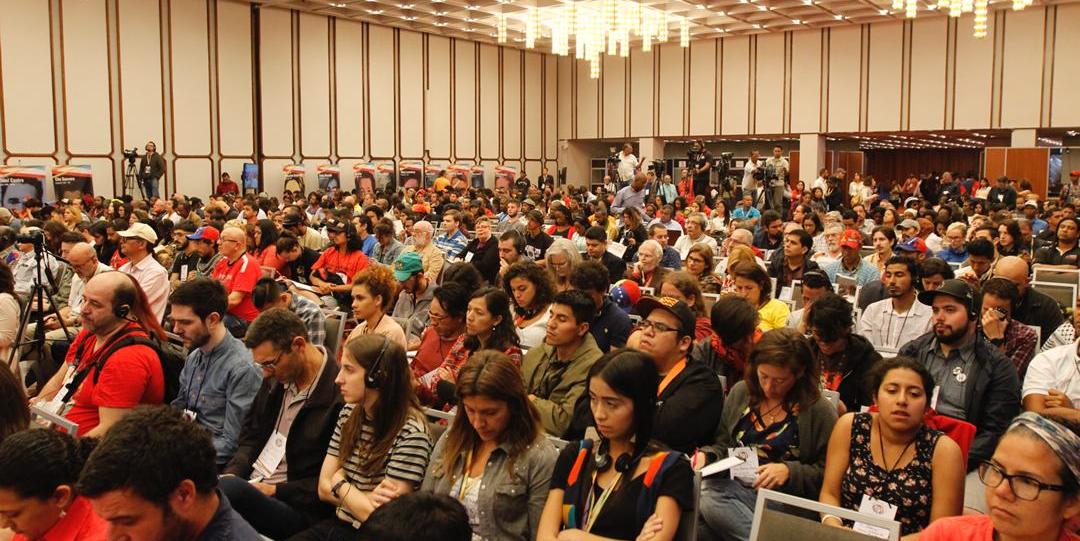
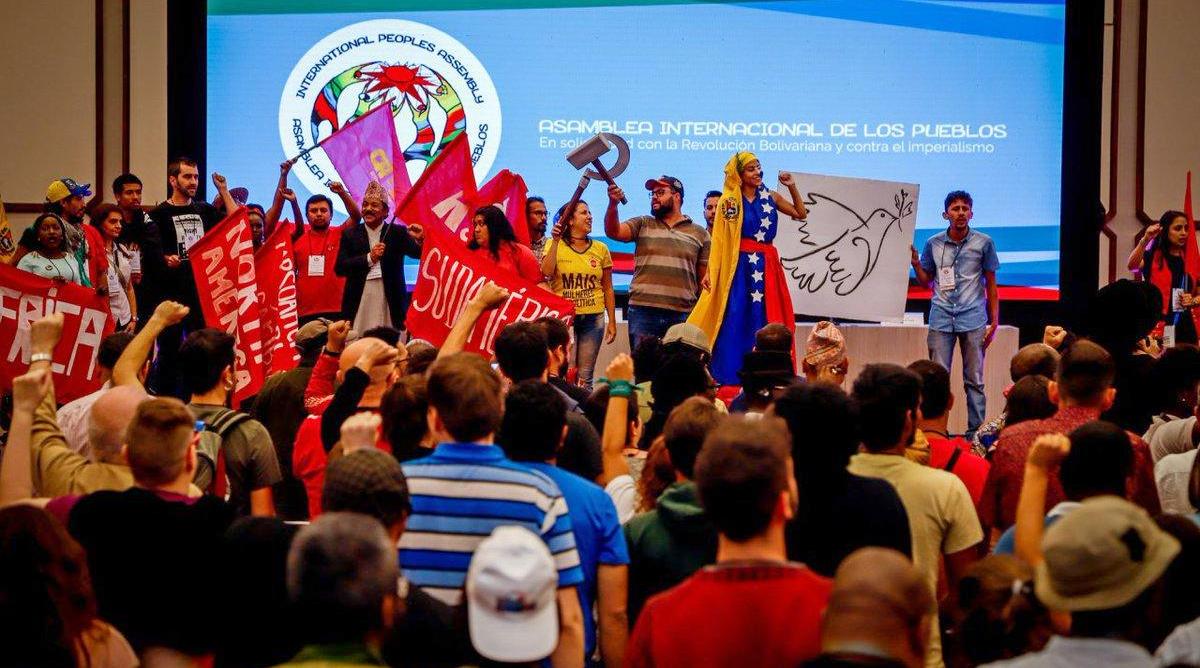

 Certainly the declaration issued
at the end of the meeting was full of venom directed against
Nicolás Maduro and his government regarding the February 23
events on the bridge and much more. It also called for tightening the
brutal economic siege against the country and stepping up attempts to
isolate the Bolivarian government while insisting on the "immediate
provision of humanitarian assistance." It contained language aimed at
getting a the UN Security Council to authorize an intervention against
Venezuela, saying that "the continuance of Nicolás Maduro and
his illegitimate regime in power represents an unprecedented threat to
security, peace, freedom and prosperity throughout the region," but the
U.S. was unsuccessful in getting the endorsement of the use of force it
wanted. When the EU representative spoke she rejected any use of force
as did Brazil's Vice President, Retired General Hamilton Mourão,
who said mistakes made in the "terrible" 20th century should not be
repeated, and that the region's commitment to peace should be upheld.
Mike Pence in the end could only remind everyone else that if a
"peaceful transition" is not possible, all options are still on the
table for the U.S.
Certainly the declaration issued
at the end of the meeting was full of venom directed against
Nicolás Maduro and his government regarding the February 23
events on the bridge and much more. It also called for tightening the
brutal economic siege against the country and stepping up attempts to
isolate the Bolivarian government while insisting on the "immediate
provision of humanitarian assistance." It contained language aimed at
getting a the UN Security Council to authorize an intervention against
Venezuela, saying that "the continuance of Nicolás Maduro and
his illegitimate regime in power represents an unprecedented threat to
security, peace, freedom and prosperity throughout the region," but the
U.S. was unsuccessful in getting the endorsement of the use of force it
wanted. When the EU representative spoke she rejected any use of force
as did Brazil's Vice President, Retired General Hamilton Mourão,
who said mistakes made in the "terrible" 20th century should not be
repeated, and that the region's commitment to peace should be upheld.
Mike Pence in the end could only remind everyone else that if a
"peaceful transition" is not possible, all options are still on the
table for the U.S.
